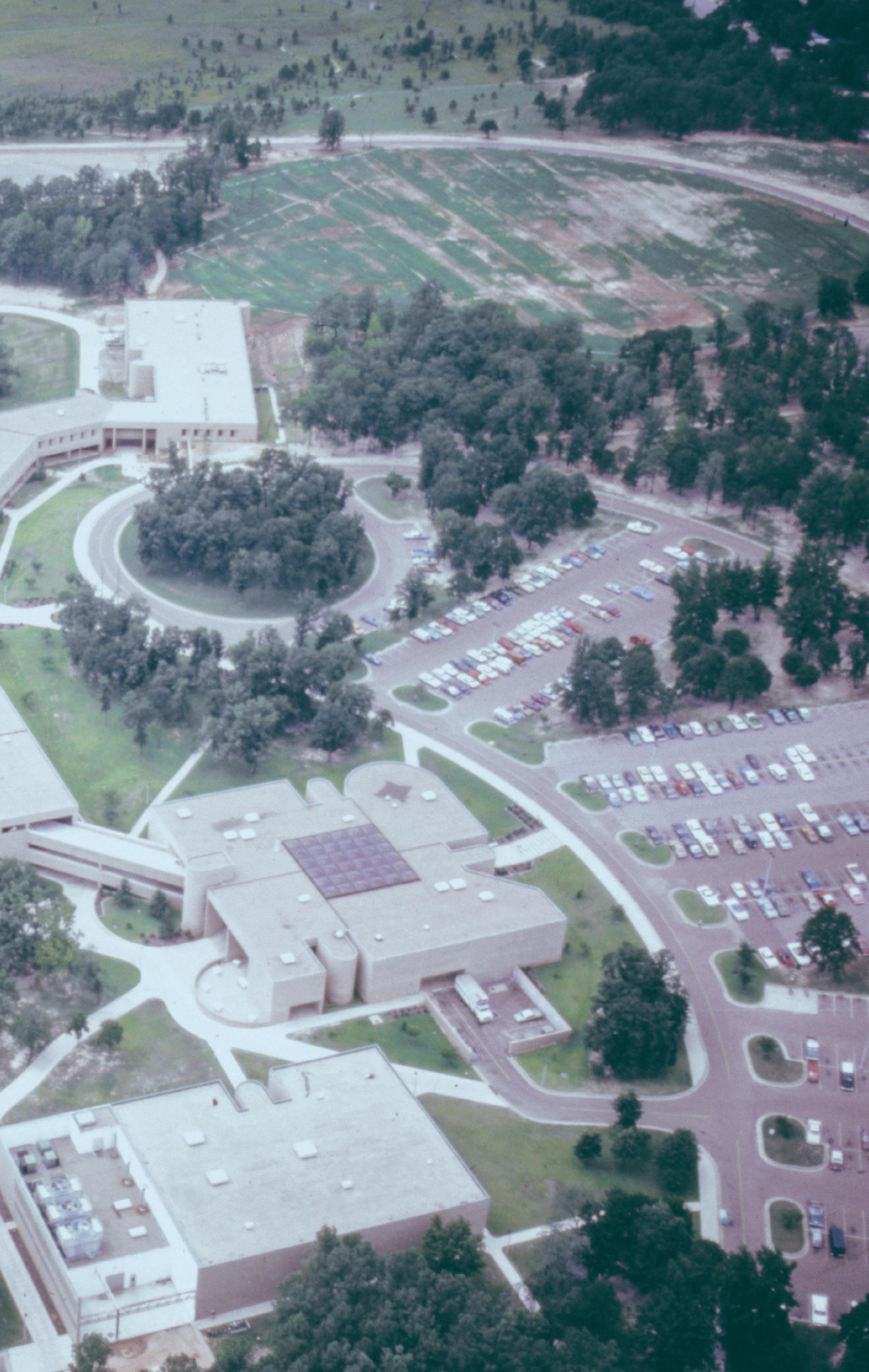The quest to make life better for East Texans







The quest to make life better for East Texans






PLEASE ALLOW ME to welcome you to a new year and the relaunched UT Tyler Magazine. With everything happening at the university and across East Texas, it seems only fitting to reintroduce the publication now.
In 2021, under the authority of the UT System Board of Regents, UT Tyler merged with the UT Health Science Center at Tyler. We have capitalized on the strengths of both institutions to create a comprehensive university that is fully equipped to help meet the academic and health care needs of the East Texas region. This consolidation also allowed UT Tyler to advance to an R2 Carnegie Classification. This designation represents UT Tyler’s very high level of research activity focused on improving East Texas and beyond.
While UT Tyler has a farreaching academic and health care impact, you will see in this issue that we remain focused on serving East Texas — the region we call home. UT Tyler continues to grow with the East Texas region in mind.
Plans are to increase enrollment by making education more accessible and more affordable, especially in rural counties. We are expanding our academic programs to respond to the needs of our communities and industry partners, and these programs are nationally recognized and continue to advance in rankings. The most recent U.S. News and World Report Best Colleges rankings list our engineering program in the top 50 nationwide, and our engineering alumni continue to give back to support future engineers. Harnessing the power of technology to meet a vital need, our online master’s in nursing program was also just ranked 24th in the nation.
Contributing to the success of East Texas is a passion also shared by our alumni. We are so proud of Josh and Holly Smallwood, and their story is incredible. I urge you to read about the destination experience they’ve created to benefit the region.
One of our most highprofile endeavors is the School of Medicine, which is just a few short months away from welcoming its first class. There has been tremendous interest in the School of Medicine, so on be half of the university, I extend my sincerest gratitude to the UT System Board of Regents and the community for their support.
The mission of the School of Medicine is to address the shortage of physicians and lack of access to health care in East Texas by training students who are from East Texas and have a passion for improving the health of the region.
The medical school will not only help improve the quality of life of our communities, but it will also boost the economy. Economic experts predict the School of Medicine will create more than $1 billion in annual economic activity. We are merely giving back to the region that has given so much to us. To whom much is given, much is required.
I hope you enjoy this issue (kudos if you can find our pal Swoop hidden on the cover), and if you are an alum, we certainly want to hear from you. Keep us up to date on the wonderful things happening in your career.
With Patriot pride,
A freelance writer ba‑ sed on Florida’s Gulf Coast, Ferguson has written pro‑ files and features for companies and academic institutions across the United States, including Prin‑ ceton University and the University of Pennsylvania. She previously served as a communications manager at Harvard Business School Publishing, and pub lic relations direc‑ tor for two museums.

A frequent contrib utor to The New York Times and New Yorker in addition to many other nati‑ onal publications. He received his BFA from the Milwaukee Institute of Art and Design in 2000 and his MFA from The School of Visual Arts in New York City in 2013, and doesn’t regret the student debt one bit.




IN JULY OF 2022 , The University of Texas at Tyler made an exciting announcement: The Robert M. Rogers Foundation had committed $10 million to support mental and behavioral health education initiatives in the School of Medicine, the School of Nursing, and the Ben and Maytee Fisch College of Pharmacy.
The gift’s impact reverberated across the institution, eliciting excitement among faculty, staff and students alike. “Our behavioral health outcomes are among the direst in the country, and a large percentage of physical health outcomes have an underlying behavioral health component,” observes Dr. Brigham Willis, founding dean of the School of Medicine. “Increasing educational opportunities for behavioral health practitioners is
an important foundational step for the entire school, and this gift will enable us to do that.”
Willis is particularly excited by the interdisciplinary nature of the gift, which touches upon all facets of mental and behavioral health education. One segment of the gift will go toward establishing the Robert M. Rogers Scholarship and mental health curriculum in the School of Medicine, while other funds will support faculty positions in the School of Medicine as well as the School of Nursing and the Fisch College of Pharmacy. Additionally, the department of psychiatry will be known as the Robert M. Rogers Department of Psychiatry.
“As a new school, resources and support for new programs can be difficult to secure, so the effect of philanthropy at this point in our development is profound,” Willis notes. “We have wideranging needs — we want to develop curriculum, expand clinical services and flesh out departments to help people in communities across East Texas — so
support like that shown by The Rogers Foundation is essential.”
Dr. Julie Philley, executive vice president for health affairs and vice provost, is equally enthusiastic. “This gift reaches across disciplines, allowing us to train doc tors, nurses and pharmacists,” she says. “Delivering mental health care takes a team, and this transformational gift will enable us to work together for the common good.”
East Texas is a large region comprised of 35 counties, and most of the population lives in small towns without access to mental health resources, Philley continues. “This gift will allow us to meet people where they are as well as partner with other entities committed to delivering mental health training and services.”
For Dr. Barbara Haas, dean of the School of Nursing, the import of the gift is undeniable. “At present there’s a huge shortage of mental health care providers, and with onethird of adults seeking mental health care services, there’s clearly a need,” she says. But more providers cannot be trained if there aren’t sufficient educators, Haas points out, which is why the Rogers Foundation gift is so important. “The gift will allow us to create an endowed chair for psychiatric mental health nursing, which in turn will allow us to recruit high quality mental health nurse practitioners to serve as faculty,” she explains.
“Transformational gifts like the Rogers contribution assist UT Tyler in fulfilling our mission of providing excellence in education, research and advanced health care delivery,” concludes Dr. Ar
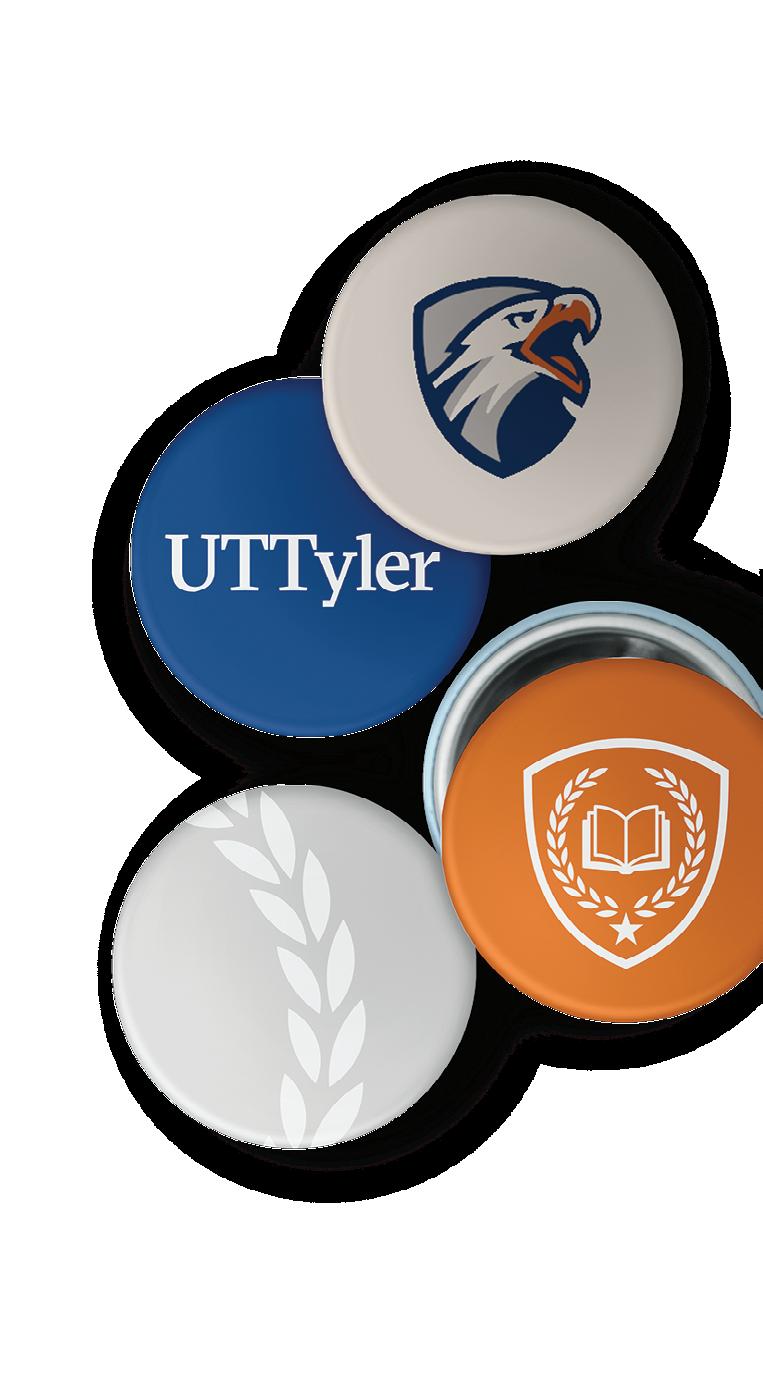
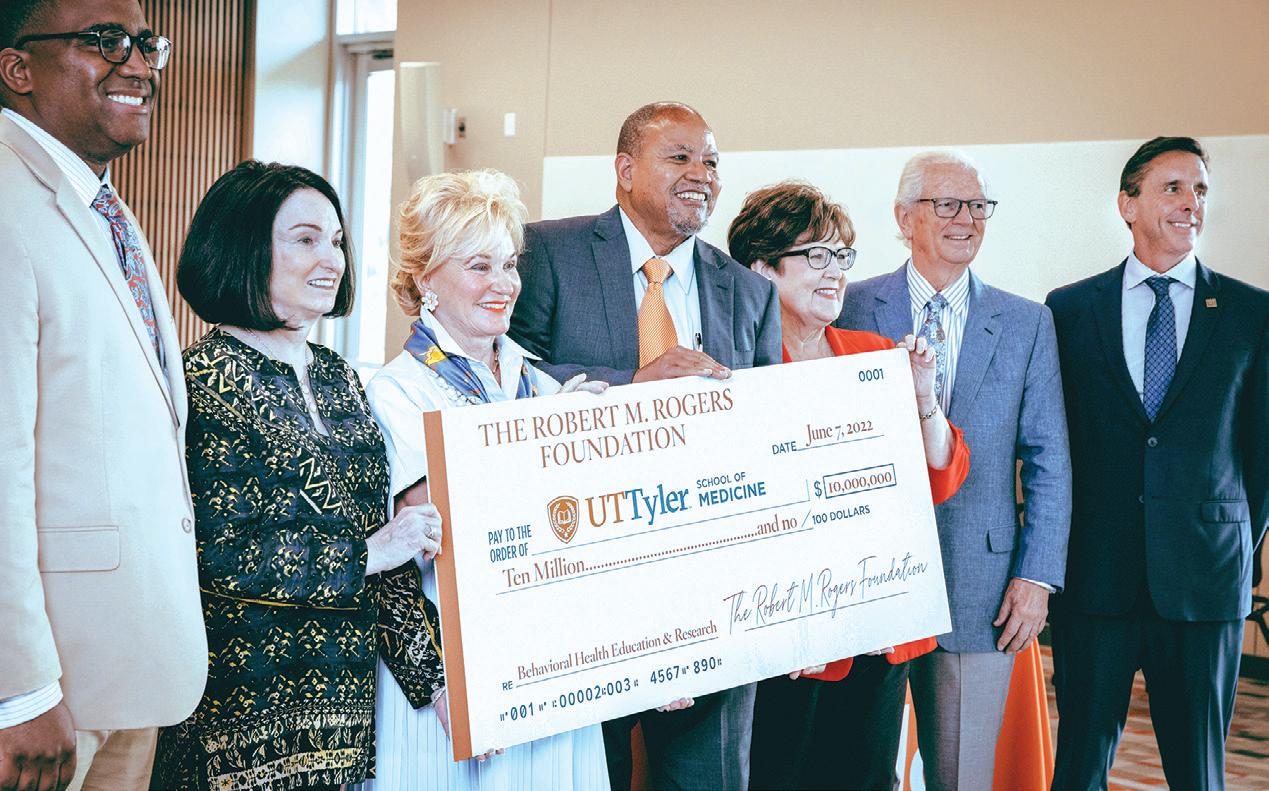
The consolidation of The University of Texas at Tyler and The University of Texas Health Science Center at Tyler under one administrative umbrel‑ la expanded the in‑ stitution’s mission and vision. ¶ The merg‑ ed university integrates the talent and assets of each institution to more comprehen sively serve the educa‑ tional, health and re‑ search needs of East Texas. ¶ A new visual brand was introdu‑ ced to accurately rep‑ resent the new insti‑ tution. ¶ “We gathered valuable input from internal and external constituencies to develop a brand that represents our full integration as one cohe‑ sive family,” says Pres ident Kirk A. Calhoun, MD, FACP. “The new brand also projects us as a competitive, unified entity within the UT System.” ¶ The new logo demonstra tes UT Tyler affili‑ ations with both UT Sys‑ tem and UT Health East Texas, and the color blue represents UT Tyler’s brand equity and distinguishes the uni versity from the health system. ¶ Since the
previous academic lo go was also shared by the athletics program, it was necessary to refresh the athletics vis‑ ual identity. Working with the athletics pro‑ gram, students, fac ulty, staff, alumni and friends of the universi ty, UT Tyler officials developed an identity system that reflects athletics’ strong histo ry of success, visually includes the mascot “Swoop” and strategi cally connects to the academic brand. ¶
“With UT Tyler now com‑ peting in NCAA Divi sion II, our new athletic marks contribute to our building on the al‑ ready positive rep utation of UT Tyler’s athletics program,” says Dr. Howard Patter‑ son, vice president for athletics. The new athletics marks are also used in spirit settings. ¶ The univer‑ sity is gradually in
DELIVERING MENTAL HEALTH CARE TAKES A TEAM, AND THIS TRANSFORMATIONAL GIFT WILL ENABLE US TO WORK TOGETHER FOR THE COMMON GOOD.DR. JULIE PHILLEY, EXECUTIVE VICE PRESIDENT FOR HEALTH AFFAIRS AND
VICE PROVOST↑ President Kirk Calhoun (center) accepts $10 million gift from The Rogers Foundation. Also shown are (L to R): Dr. Archie Tucker, Sheryl Rogers Palmer, Robyn Rogers, Barbara Copeland, Bob Rice and Dr. Brigham Willis.
THECARNEGIE Classification, through the Carnegie Foundation for the Advancement of Teaching, is an allinclusive classification for colleges and universities. The classification includes all accredited, degreegranting colleges and universities in the United States that are represented in the National Center for Education Statistics Integrated Postsecondary Education Data System.
This R2 classification designates UT Tyler research activity as very high. “It recognizes the highquality research in which our faculty and students are engaged and represents a landmark for expanding those efforts,” says Dr. Steven Idell, senior vice president for research.
Following the unification of UT Tyler with The University of Texas Health Science Center at Tyler, the combined research qualified UT Tyler for an R2 designation. The university’s research, which is conducted by five colleges and three schools, is dedicated to helping improve the quality of life for the East Texas region as well as throughout the state of Texas and the nation.
UT Tyler hosts the annual East Texas Research Conference to present new and emerging research conducted by its academic and health professionals as well as researchers from other institutions and organizations in the region.
Current research includes studies examining community health, COVID 19, lung injury and repair, infectious lung disease, engineering, education, business, biological sciences and the liberal arts.
UT Tyler enrolls 10,000 students representing:
66 nations
42 states
162
SACSCOC
Southern Association of Colleges and Schools
ACPE
Accreditation Council for Pharmacy Education
ACS
American Chemical Society
ATMAE

MAIN CAMPUS SIZE
Nestled in the picturesque East Texas piney woods, UT Tyler’s acreage totals:
Ranked in Top 50 Best US Programs
Association of Technology, Management and Applied Engineering
AACSB
Association to Advance Collegiate Schools of Business International
CCNE Commission on Collegiate Nursing Education
CACREP Council for Accreditation of Counseling and Related Educational Programs
ABET
Accreditation Board for Engineering and Technology
RATIO
The current student-tofaculty ratio is 22:1
10 11 12
ACOTE Accreditation Council for Occupational Therapy Education
NASM National Association of Schools of Music
BON Texas Board of Nursing
ACGME American Council for Graduate Medical Education
UT Tyler is celebrating a top 50 national ranking. The university’s College of Engineering has been ranked No. 42 on the U.S. News and World Report’s Best Undergraduate Engineering ProgramsNo Doctorate list for 2023. The college has been on a steady climb up the publication’s top 100 list for four consecutive years, rising this time from last year’s ranking of 75. ¶ For the second consecutive year, UT Tyler is the highest ranked Texas public institution for undergraduate engineering programs with no doctorate. ¶ “This recognition by U.S. News and World Report reflects the continued commitment of our faculty and staff to provide students an engaging, meaningful experience,” says Dr. Javier Kypuros, dean of the College of Engineering. ¶ This is just one of UT Tyler’s most recent rankings from the publication. The list also ranked the UT Tyler undergraduate nursing programming 112th. ¶ UT Tyler provides the only comprehensive engineering college in East Texas, offering degree programs in chemical, civil, electrical and mechanical engineering, along with two upcoming programs in computer engineering and construction engineering. The college also provides construction management programming.
— HANNAH BUCHANANOur


Dr. Kouider Mokhtari, associate vice president for research and associate dean of the UT Tyler Graduate School, has been ap pointed by the King of Morocco as one of 20 experts to serve on Morocco’s Supreme Council for Education, Training and Scien tific Research. The council will work to promote education, training and scientific research to improve Moroccan schools and provide quality education for all. ¶ “Dr. Mo‑ khtari has been a great expert in literacy research and training, a passionate advocate for the value of education and an amba‑ ssador of hope in education arenas,” says Dr. Amir Mirmiran, UT Tyler provost and execu‑ tive vice president for academic affairs. “His selection by the King of Morocco provides an oppor‑ tunity for him to expand his valuable impact to his home country.”
AAMC PRESIDENT AND CEO David J. Skorton, MD, and AAMC Board Chair and UT Tyler President Kirk A. Calhoun, MD, challenged physicians and scientists from U.S. medical schools and teaching hospitals to work collectively to improve the health and mental wellbeing of colleagues and communities.
Nearly three years after COVID 19 caused massive upheavals in the nation’s health care system — to which “learners, faculty, staff and leaders have risen to the occasion magnificently” — challenges remain. “We find ourselves still in a situation of fragmented communities, often bitterly divided political opinion, and severe difficulties hearing and listening to each other,” Skorton tells more than 4,300 medical professionals during the leadership plenary of Learn Serve Lead 2022: The AAMC Annual Meeting.
In addition to representing medical schools, teaching hospitals and faculty, the AAMC oversees the medical school admissions test (MCAT), the residency matching programs and numerous medical student and medical faculty support initiatives.
Calhoun served as board chair November 2021 to November 2022 and is currently serving as immediate past chair.
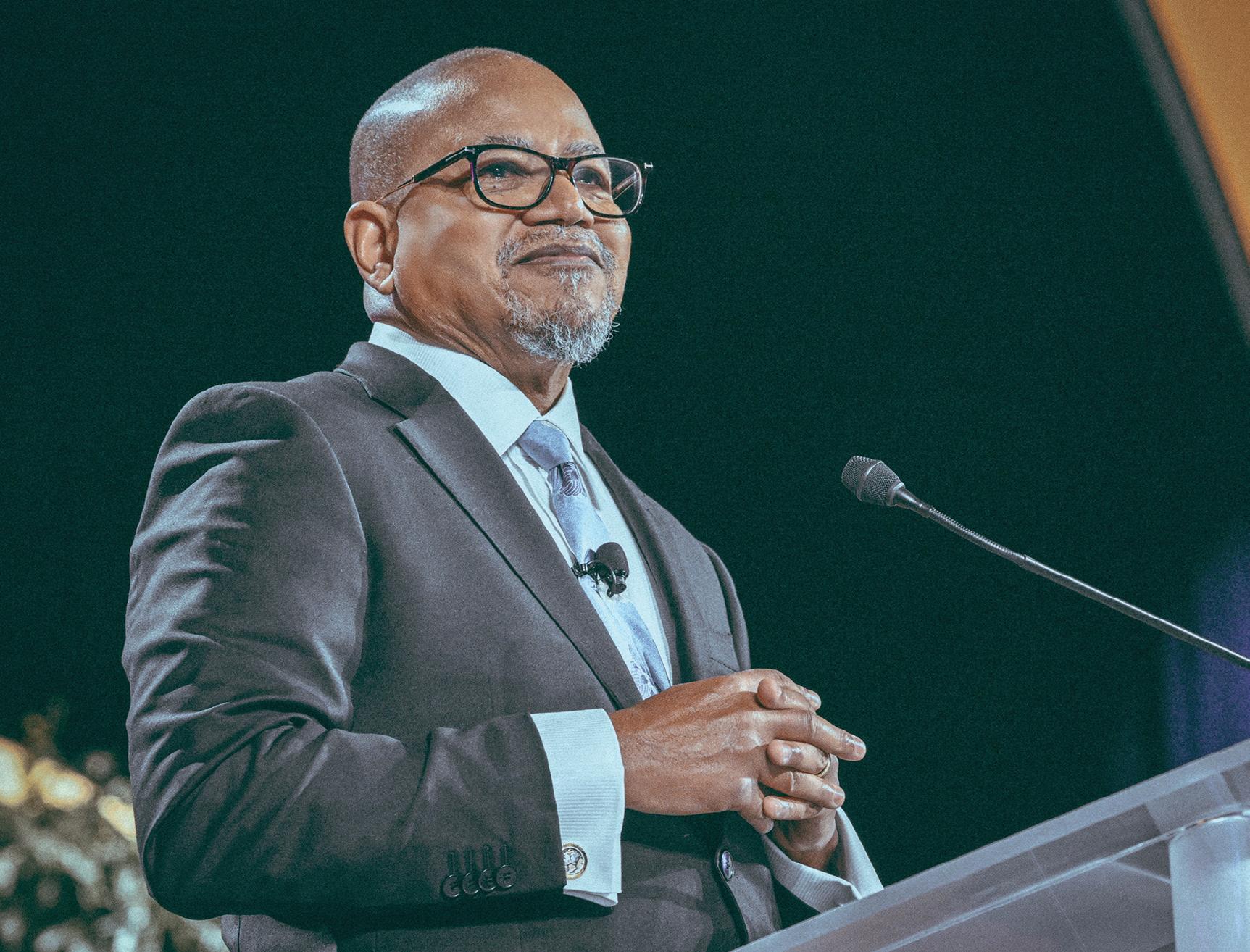
“Academic medicine lies at the nexus of higher education and health care delivery. Both exist in the very treacherous waters of rapidly changing expectations, misinformation, partisan debate and economic pressure,” says Calhoun. “As we engage in informed and heartfelt dialogue based on the facts, I beg you to never forget the immediate unmet needs of our patients and their families, students, faculty and community.”
¶ Mokhtari is also the Ander son Vukelja Wright Endowed Pro‑ fessor of Literacy Education at UT Tyler, where he engages in research, teaching and service initiatives aimed at advancing lit‑ eracy instruction and increa‑ sing students’ literacy achieve ment outcomes. ¶ “This is a pres tigious appointment that speaks to Dr. Mokhtari’s remarkable stature,” says Dr. Steven Idell, UT Tyler senior vice president for research and dean of the Grad‑ uate School. “His input is most appropriately sought and welcomed by this austere council, which is a testament to his experience, communication skills and carefully crafted perspectives.”
¶ Mokhtari’s research focuses on the acquisition of language and literacy by first and second language learners. — HB
THE UNIVERSITY OF Texas at Tyler has been awarded $1.9 million from the U.S. Department of Education’s Mental Health Service Professionals Demonstration program, which is designed to increase the number of high quality and diverse mental health professionals and address the lack of mental health services in schools.
The program was authorized by U.S. Sen. John Cornyn’s (RTX) Bipartisan Safer Communities Act addressing specific concerns leading to violence in schools, including the need for additional mental health services.
According to Mental Health America, more than 73% of youth in Texas who have significant mental health needs remain untreated. Unmet mental health issues can significantly impact youths’ academic achievement and ability to develop, especially those in povertystricken and rural areas.

Through the fiveyear grant, UT Tyler will partner with local school districts to enhance their capacity to provide mental health services to their students.
Dr. Citlali Molina, assistant professor and school counseling program coordi nator, and Dr. Erin West, associate professor of counseling, serve as grant primary coinvestigators and project codirectors. Both are certified professional school counselors and licensed professional counselors.
“Given the significant mental health challenges faced by East Texas youth and the barriers they face for accessing treatment, schools are their best hope for getting the care they need,” says Molina. “This project will allow UT Tyler’s counseling programs to strengthen and build sustainable infrastructures to support students’ required fieldwork, place more qualified practitioners in highneeds schools and continue expanding these services across the region beyond the grant funding period.”
The project will place UT Tyler graduatelevel school counseling and clinical mental health counseling students or counselors in training at 15 highneeds schools within the partnering local education agencies.
“No parent should fear for the safety of their student when they drop them off at school, and no student should be afraid when they walk into the classroom,” Cornyn says in an announcement about the funding. “In the aftermath of the tragedy in Uvalde, I’m grateful that meaningful solutions are starting to be delivered through this funding to prevent violence, provide training to school personnel and students, and hire additional mental health professionals in Texas schools.”
Molina has 14 years of experience in public education, and that experience led her to study teacher student relationships. West was instrumental in developing an internship program that benefits both the university and Whitehouse Independent School District.
UT Tyler is transforming its Honors Program into a new Honors College. Started in 2009, the Honors Program began with a cohort of 20 students and has grown to approximately 200 students. Projections are to reach 300 by fall 2025. ¶ “The Honors College will help recruit more high achieving students and engage more faculty in honors education,” says Dr. Amir Mirmiran, provost and executive vice president for academic affairs. “The greater visibility of the Honors College will also help our graduates to better serve East Texas and beyond.” While not degree granting, the Honors College will provide specialized content and programming for high achieving and intellectually curious students who comprise a community reflecting the population and people of the East Texas region. ¶ The college emphasizes small, unique courses with engaged faculty and rigorous undergraduate research. Students who complete the Honors College will earn an Honors designation on their final transcript. Because of their varied and enhanced collegiate experience, Honors graduates are among the most sought after by employers and graduate schools. Dr. Paul Streufert has served as the founding director of the program for 14 years, and he has been appointed to serve as the founding dean of the college. — HB
The UT Tyler community re‑ minded him of the close knit private high school he attended. ¶ “It was a great community like here at UT Tyler, so visiting the uni‑ versity was like coming home; but, honestly, I’ve dug deeper roots here than I ever did back home,’’ says Smith,
who began attending UT Tyler in 2020 and is majoring in history with a minor in prelaw. He plans to attend law school after graduating this spring. ¶ Serving as Student Government Association president this year, Smith says the university has exceeded his expectations in the class‑
room and beyond. ¶ A history buff, he enjoys interacting with classmates and profess‑ ors who share his enthusi asm for the subject. He also has thrived in his courses, making the President’s Honor Roll and receiving the 2022 Frank H. Smyrl Endowed History Scholarship for aca‑
demic excellence. ¶ “The nice part about the Depart ment of History is that our professors are passionate about what they teach, and students feed off of that,’’ Smith says. “And when they see us getting excited about what we’re learning, they get excited. That makes lear‑ ning easier and has deep ened my love for history.’’ ¶ Early on at UT Tyler, he was eag‑ er to get involved on campus – but hesitant to take part in SGA. He played football and was a member of the debate team and drum line in high school, but never participat ed in student government.
¶ Encouraged by friends to give it a try, he ran for SGA chief of staff and was elected.
“I just fell in love with stu‑ dent government,’’ says Smith, who quickly advanced to vice president and then pres‑ ident. “I love getting to in teract with people and work together toward a common goal.’’ ¶ SGA involvement has led to other opportunities for Smith, from representing UT Tyler on the UT System Student Advisory Council to being mentored by city officials in a partnership be‑ tween the SGA executive board and the city of Tyler. Outside of student govern ment, he mentors students in the Freshman Leadership Initiative and represented the university as a Rose Scholar in the 2022 Texas Rose Festival in Tyler. ¶ “Since com‑ ing to UT Tyler, I’ve gotten a lot better about putting my‑ self out there and taking ini tiative,’’ says Smith, adding that community and opp‑ ortunity are two of the univer‑ sity’s strongest assets.
“There are so many opportu nities at UT Tyler, and I believe it’s because of the culture of community here. Community and opportunity work in tandem.’’ ¶ Wherever life takes him after graduation, Smith says he’ll be back to UT Tyler for visits — and it will always be like coming home.
— EMILY BATTLE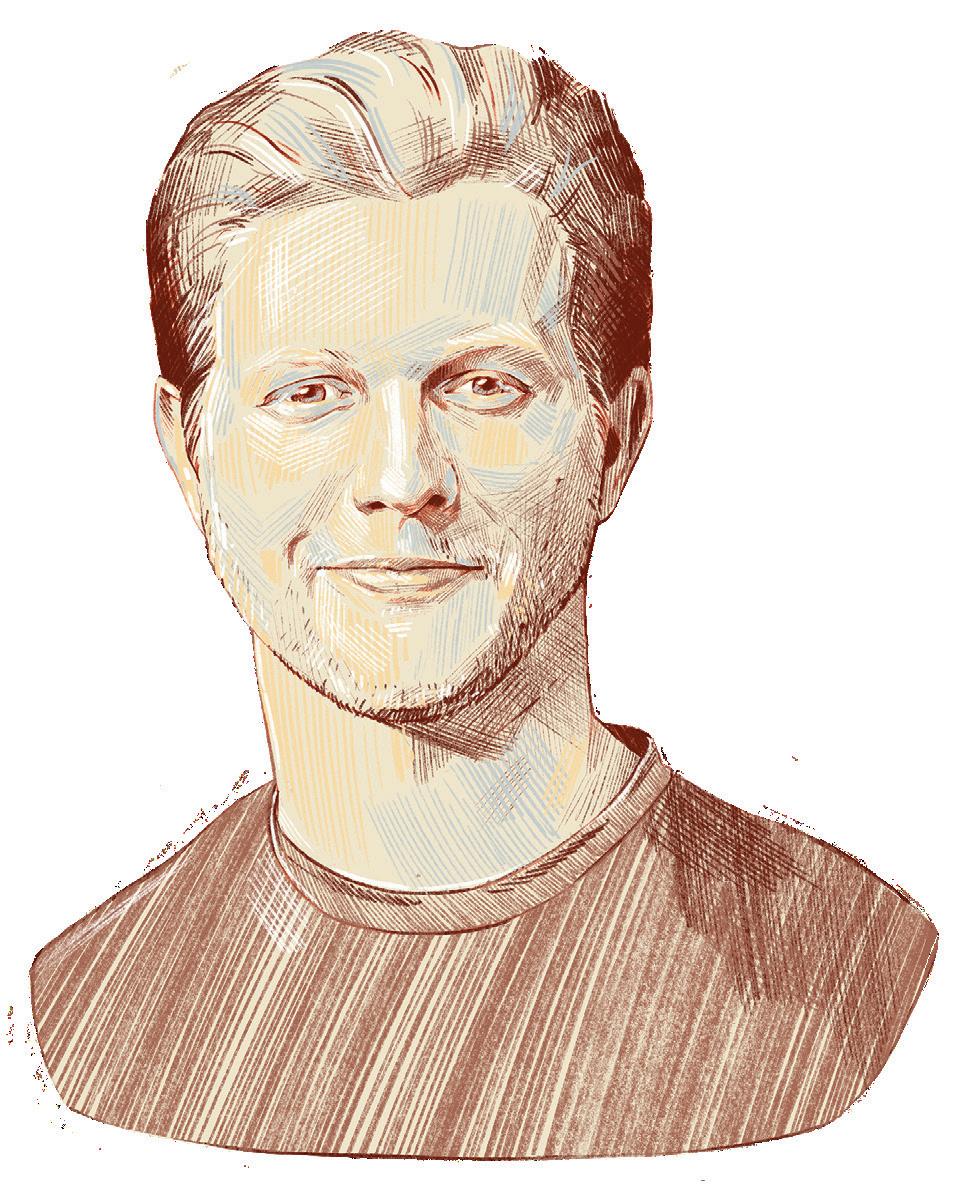
EDUCATION
UT Tyler
History, Pre-Law Studies
2020 – May 2023
Trinity Christian Academy
High School 2015 – 2019
EXPERIENCE
Student Worker University of Texas at Tyler
Aug. 2021 – Present
Legal Assistant
The Law Office of Cameron Jackson
Aug. 2021 – Oct. 2021
Legal Assistant
The Pettitt Firm
June 2021 – Aug. 2021
ACTIVITIES
UT Tyler Student
Government
President, Former Chief of Staff and Vice President
Freshmen Leadership Initiative Mentor ⁄ Director History Club Member
Visiting campus the first time, Landry Smith was impressed with UT Tyler’s parklike setting, nestled in pines and oaks with Harvey Lake at its center, but it was the culture of community among students, faculty and staff that made him feel at home. ¶ At the time, Smith was a freshman at a community college in his hometown of Aledo and looking to transfer to a four-year university.ILLUSTRATION BY LAURA HOPE
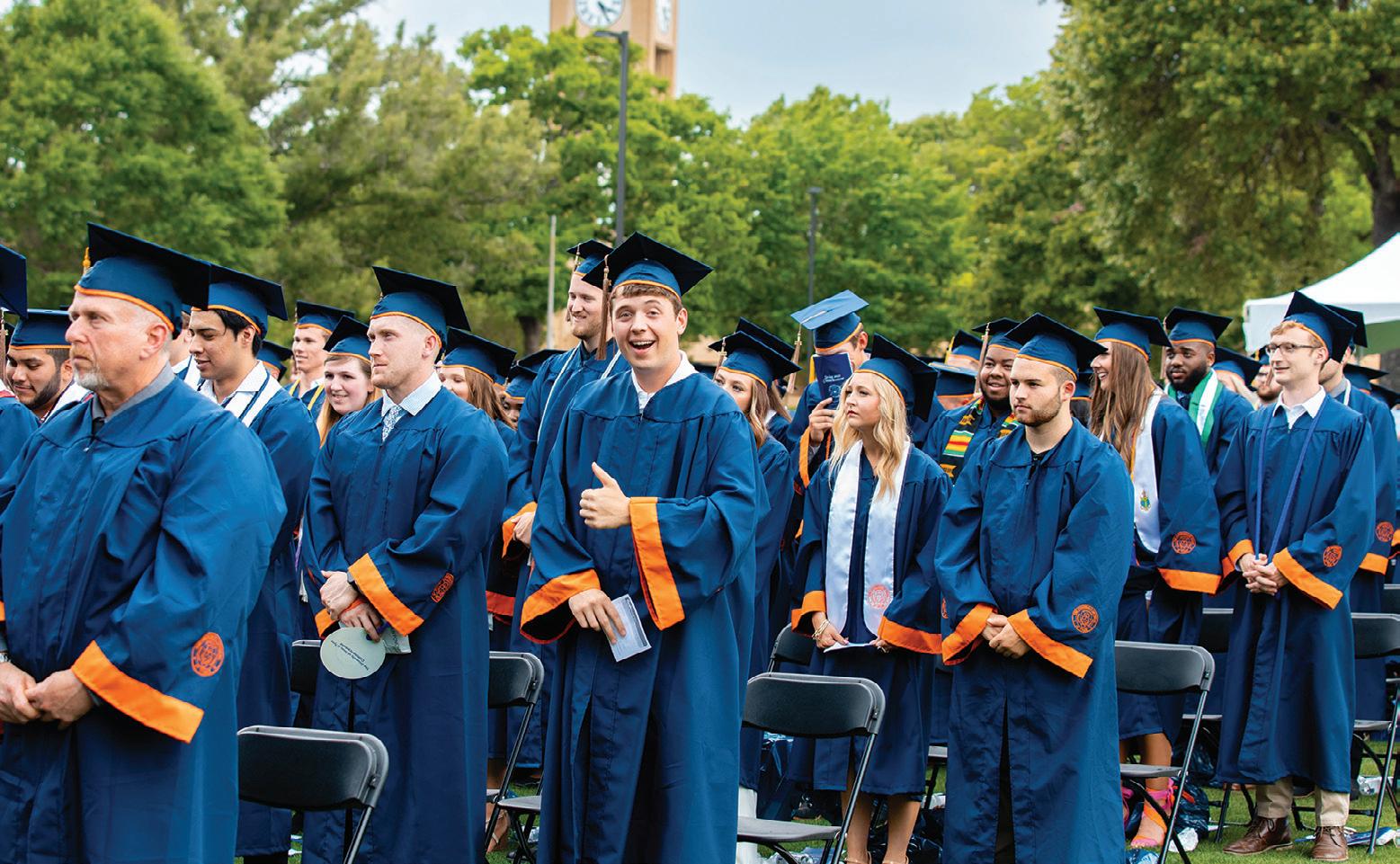 BY HANNAH BUCHANAN
BY HANNAH BUCHANAN
ON THE HEELS of the new Doctor of Medicine degree programming, UT Tyler is launching several new academic degrees and certificates with planned start dates in 2023 and 2024 to further meet the educational needs of East Texas. Housed within the UT Tyler Soules College of Business, the online Master of Science degree in cybersecurity and data analytics program is designed to
↖ UT Tyler is expanding its degree offerings, which currently include more than 90 undergraduate and graduate programs.
help address the shortage of cybersecurity professionals regionally and beyond. Inaugural classes will start this year.
Upcoming certificates, also within the Soules College of Business, include cybersecurity, data analytics and business legal studies.
The UT Tyler College of Engineering will offer two new Bachelor of Science degree programs in computer engineering and construction engineering, along with a master’s program in engineering leadership, with all set to begin this year. “With these additions, we will have the most comprehensive portfolio of engineering programs in East Texas,” says Dr. Amir Mirmiran, provost and executive vice president for academic affairs.
In addition, the UT Tyler College of Education and Psychology plans to offer a Master of Science degree in psychological sciences with a proposed launch date of spring 2024.
Dr. Mark Owens and Dr. Kenneth Bryant Jr., associate profes‑ sors of political science, and Dr. Ken Wink, professor of public administration, have been recog‑ nized for their outstanding work in the world of politics and public opinion. ¶ The profes‑ sors support the UT Tyler Center for Opinion Research, which has garnered heightened atten‑ tion since its debut in fall 2018. The center includes a professional survey system for students to learn about survey research by experiencing how the data is collected. Studies have also contri‑ buted to published academic works to better understand Texas and the public's perceptions about topics. ¶ “The quality of work that is done by the Center for
Opinion Research is impressive,” says Dr. Neil Gray, dean of the College of Arts and Sciences. “We are proud of Mark, Kenneth, Ken and their teams of students who gain valuable experience while learning about survey resea‑ rch.” ¶ The trio’s latest publica‑ tion, “Battle for the Heart of Tex as: Political Change in the Elec‑ torate,” explores current political trends based on the polls, sur‑ veys and focus groups conduct‑ ed by the center in partnership with The Dallas Morning News. The book was published by The University of Oklahoma Press. ¶ “While Texas is truly different from the rest of the nation, the state finds itself at the forefront of national discussion about public policy,’’ says Owens, the
center’s director. “‘Battle for the Heart of Texas’ presents a deeply researched look at who Texas voters are, what they want and what it might mean for the future of the Republican and Democratic parties, the state and the nation.” ¶ Additionally, the UT Tyler/DMN polls have been recently acknowledged by RealClearPolitics for accuracy. UT Tyler/DMN polls are currently ranked among the top 20 — at No. 16 — in the profession for state polls in the 2020 senate, 2020 presidential, 2018 senate and 2018 governor projections. RealClearPolitics is an American political news website and polling data aggregator, established in 2000.
 — HANNAH BUCHANAN
— HANNAH BUCHANAN
WITH THESE ADDITIONS, WE WILL HAVE THE MOST COMPREHENSIVE PORTFOLIO OF ENGINEERING PROGRAMS IN EAST TEXAS.
DR. AMIR MIRMIRAN, PROVOST AND EXECUTIVE VICE PRESIDENT
Online master’s in nursing program receives recognition

U.S. News and World Report named The University of Texas at Tyler Master of Science in Nursing among the nation’s top 25 best online graduate programs.
UT Tyler’s program is ranked 24 this year, which is a five spot advancement over last year. ¶ “We’re honored that our nursing program has been recognized,” says Dr. Julie V. Philley, UT Tyler executive vice president for health affairs and vice provost. “This accomplishment wouldn’t have been possible without the numerous School of Nursing faculty and staff who tirelessly work to ensure we have an exceptional program.” ¶ The UT Tyler School of Nursing aims to provide students with the advanced skills they need in a convenient format to meet the growing demand for patient care and leadership in the health care industry.
¶ “Our school offers a variety of online Master of Science in Nursing degree plans to match students’ area of interests,” says Dr. Barbara Haas, School of Nursing dean. “We’re educating nurses to strengthen the East Texas health care workforce and developing leaders to serve as change agents who will impact the health of our community.”
— ELIZABETH NEWSOM
UT Tyler’s parklike setting, nestled in pine and oak forests, is one of the biggest draws for visitors. For its proactive approach to main‑ taining that beauty, the university is designated aTree Campus USA by the Arbor Day Foundation.
THE UT TYLER debate team continues to shine, and this year’s group is no exception.
The university placed first at the recent Steve Hunt Classic, outperforming collegiate teams from across the nation. The tournament was hosted by Lewis & Clark College in Portland, Oregon.
Hunter Parrish and Josh Smith earned a 41 record in preliminary rounds, winning every elimination round to secure the championship. Angie Carroll and Harlin Dean also placed first in the junior varsity division of the tournament.
debater, was ranked the No. 1 overall junior varsity speaker.
The university participates in National Parliamentary Debate Association and National Parliamentary Tournament of Excellence events against some of the country’s top minds. Debaters compete in partnerships of two and accrue points toward a national, seasonlong ranking.
Dedicated students are exposed to the highest level of competition in the nation.
UT Tyler has had Tree Campus USA designation for five consecutive years
“The team is excited to have such a strong finish in a competition that included our elite rivals in Texas and strong liberal arts institutions in several other states,’’ says Joseph Provencher, UT Tyler director of forensics and head debate coach. “The future is bright for UT Tyler debate.”
In addition, Parrish, a thirdyear debater, was ranked the fifth overall speaker, while Smith, a secondyear debater, ranked fourth overall. Dean, a freshman
UT Tyler’s debate teams have been fortunate enough to compete at exclusive tournaments across the country—like the Steve Hunt Classic—contending against some of the topnotch debate powerhouses.
Competitors include Notre Dame, the University of California, Texas Tech University, the University of Minnesota, Morehouse College, McKendree University, Lewis & Clark College and Whitman College.

At the national level, UT Tyler has placed as high as second in the nation, with several top 20 team finishes and top five individual speaker rankings.
200+ newly planted trees including oak, elm and pecan
For every tree we lose, we plant one to replace it
Celebrated
campuses to promote tree preservation
A GROUNDBREAKING was held in January to initiate construction of the UT Tyler Medical Education Building, which will house the School of Medicine. The design, development and construction of the $308 million project was approved by the UT System Board of Regents in fall 2022.

Texas Gov. Greg Abbott, UT System Board of Regents Chairman Kevin Eltife, UT System Chancellor James Millik
en and UT Tyler President Kirk A. Calhoun, MD, FACP, joined with hundreds of community members to celebrate the groundbreaking.
“By approving the total project cost, design development and allocation of funds for the new Medical Education Building, the regents are taking the next pivotal step in launching the UT System’s seventh medical school — one that is specifically dedicated to bene
fiting Northeast Texas for generations,” Eltife says.

“This facility provides the physical cornerstone of UT Tyler’s plan to train physicians and meet health care needs across the state, while also growing workforce opportunities and economic development in the region,” Milliken says.
Construction is estimated to be completed in spring 2025. In the meantime, the School of Medicine will host classes at the UT Tyler Health Science Center, with the first class of 40 students enrolling in July.
“This is an enormous milestone for UT Tyler and for all of East Texas,” says Calhoun. “We are excited to take the next step in creating a physical home for the School of Medicine, and on behalf of UT Tyler, I want to thank the UT System and
the East Texas community for the continued support of our health care education advancements.”
The construction project is a significant milestone in meeting projected physician shortages in the East Texas region. Physician training takes seven to 15 years to complete, making it imperative to start training now, and the medical education building is necessary to help meet this goal. Having a school in East Texas ensures that doctors can receive training without having to leave the region. UT Tyler and UT Health East Texas have collaborated to make this mission possible.
“The new Medical Education Building will be one of the most exciting training venues in the nation, providing innovative, cutting edge facilities for the university to educate a new generation of physicians,” adds Dr. Brigham Willis, School of Medicine founding dean.
The building will give the School of Medicine the necessary tools to train the next generation of physicians, especially those specializing in rural health, preventive medicine and primary care.
Located on roughly five acres in the heart of Tyler’s medical district, the nearly 248,000squarefoot Medical Education Building will provide classrooms, simulation labs, clinical and operating room training spaces, offices and other multipurpose event and lecture spaces for the School of Medicine and graduate medical education programs.
One wing of the building will be a dedicated clinical space, featuring outpatient and specialty clinical services with exam rooms, specimen collection/processing and imaging facilities. The second wing will hold academic offices and classrooms. The five story building will also feature a skybridge leading to the adjacent UT Health East Texas Midtown campus.
The UT Tyler School of Medicine has received generous support from the community since it was announced. The East Texas Medical Center Foundation pledged $80 million to help create the program, the Robert M. Rogers Foundation gave $10 million to support mental and behavioral health education, the R.W. Fair Foundation donated $4 million to fully fund tuition and fees for the first class of students, and Ednaemae Walsh gifted $5 million to fully fund tuition and fees for the second class. The UT System Board of Regents committed $100 million over the next 10 years to help start the school.
With the Medical Education Building, the School of Medicine will improve the quality of health care and education in East Texas for years to come.
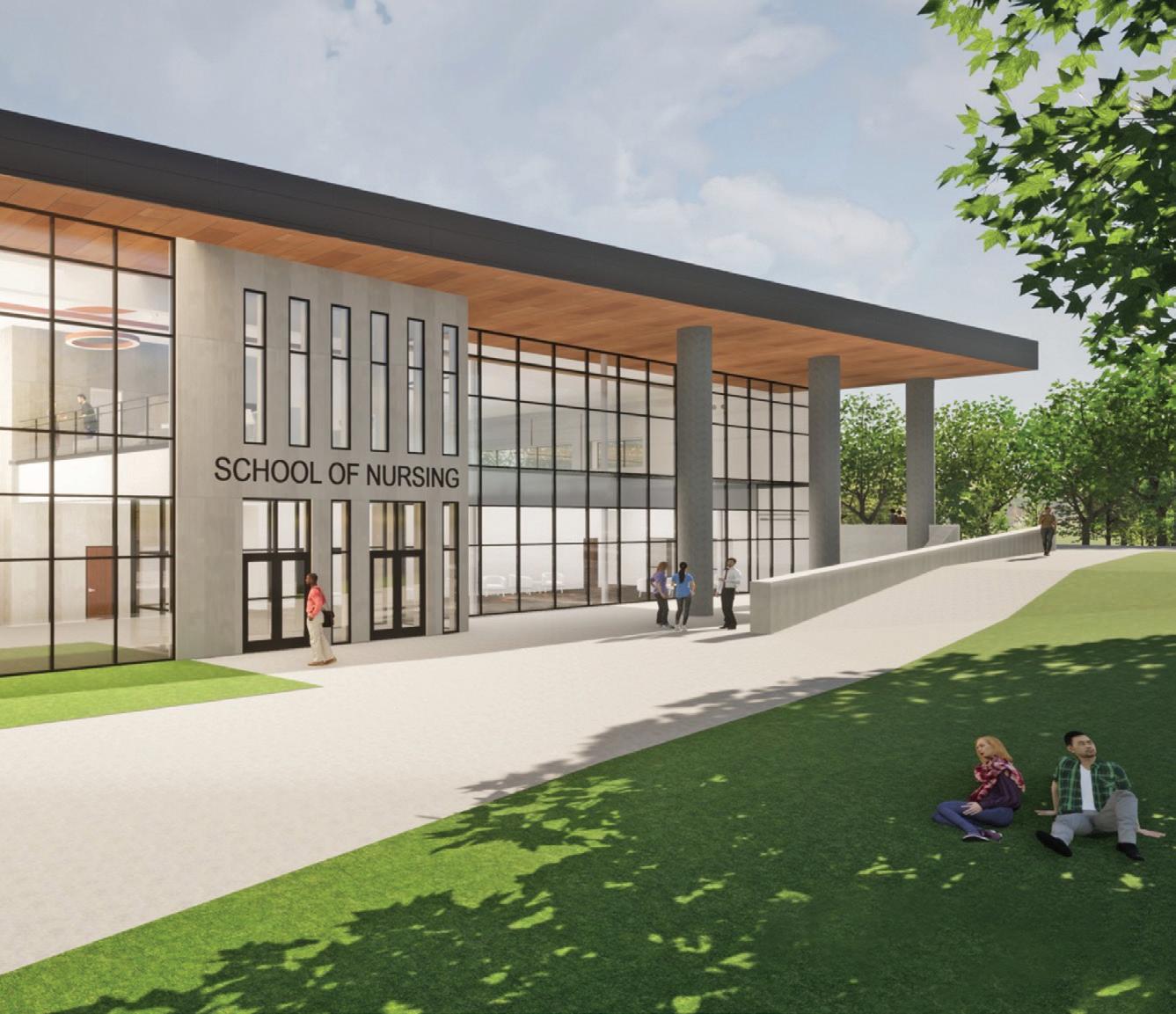
→ Braithwaite Building, housing the School of Nursing, will be renovated and expanded by 47,000 square feet. The project was initiated with a groundbreaking this spring.
In November 2019, the Board of Regents allocated $35 million for the addition and partial renovation of the Braithwaite Building for the School of Nursing, which comprises 25% of the university’s enrollment. This expansion will increase the simulation and skill lab spac es and the number of student spaces, allowing the school to accommodate a larger number of students as the program contin ues to grow. ¶ “We are very grateful for the support provided for
this addition,” says Dr. Barbara Haas, School of Nursing dean. “The School of Nursing mis sion statement notes that we are ‘learner centered,’ and this is evident in the priorities in this building design. Every decision first considered the student experience and per spective. We are so ex cited for our students to see the beautiful spaces that have been designed to support them as they pursue their nursing degree.”
¶ The first floor of the 47,000 square foot addition will be dedi cated to simulation and skills labs. After the expansion, the school will have more than three times its current capacity for simula tion. These spaces will include pods designed for medical surgical acute care, inten sive care, pediatrics, mother baby care and home health. It will expand the number of debriefing rooms, a critical component of
simulations, from two to six. Additionally, it will create an open lab where students can practice and prepare for clinicals. The school has plans to eventu ally use the second floor for collaborative research and commu nity engagement. ¶ UT Tyler offers numerous degree options for those seeking to either begin or enhance their nursing career. The Bachelor of Science in Nursing program offers tracks for entry level and registered nurses, and includes options for accelerated degree completion. Master of Science in Nursing programs are offered in an online format, providing flexibility to meet the needs and aspirations of working professionals. Two doctoral programs are offered, including the Doctor of Nursing Practice, a clinically focused path, and the Nursing PhD, a research trajectory. — EN
 BY ELIZABETH NEWSOM
BY ELIZABETH NEWSOM
DR. CATHY MILLER, professor of nursing at The University of Texas at Tyler, recently presented her research on human trafficking to the World Health Organization at the United Nations.
She was accompanied by two UT Tyler Honors students, Andrea Reyes and Kevin Larios, alongside the dean of the Honors College, Dr. Paul Streufert.
Miller’s work specifically focus ed on developing a framework for how health
care workers should respond when they treat trafficking victims.
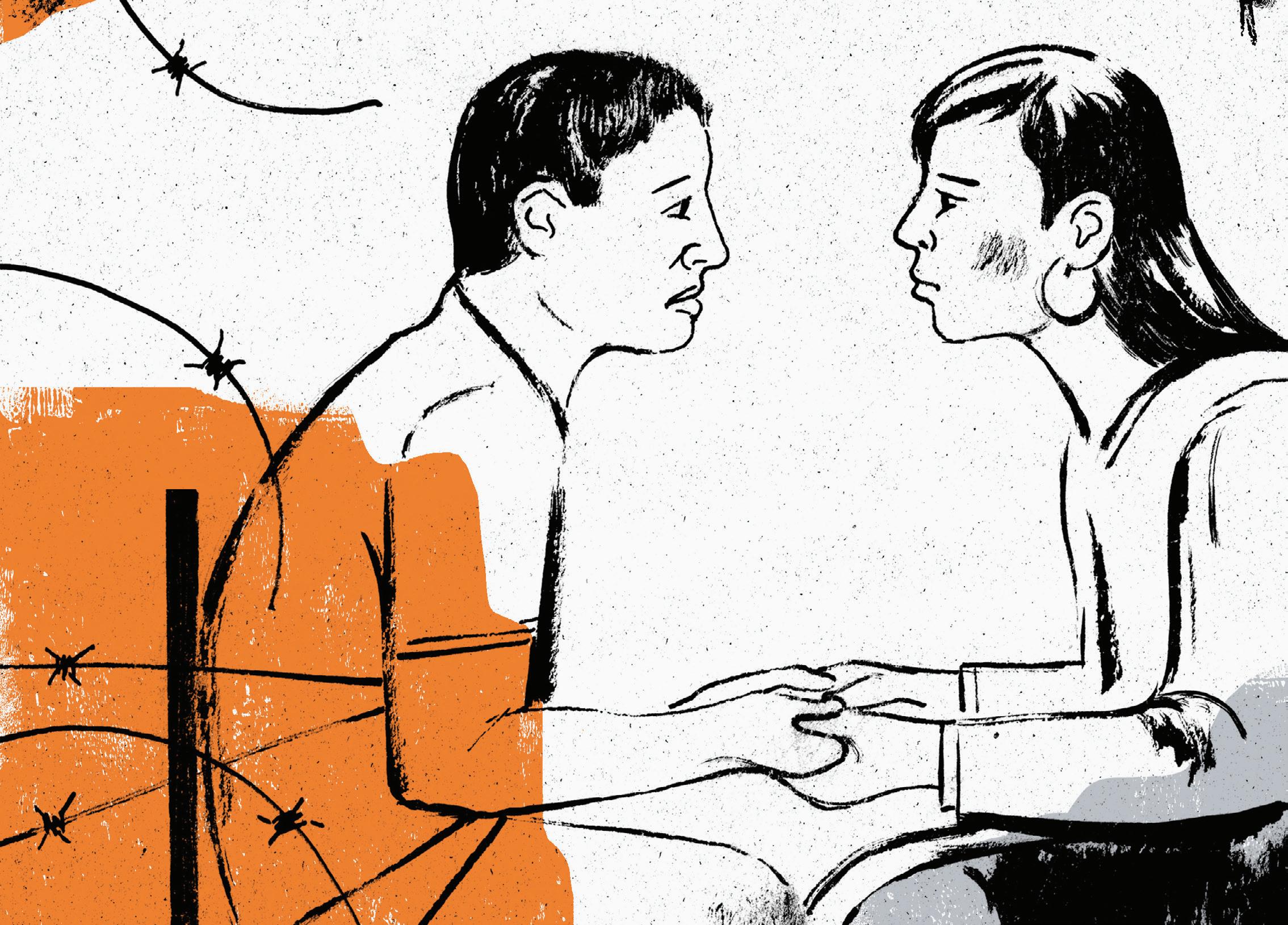
According to their research, 88% to 96% of trafficking victims see a health care provider at least once during their captivity—though most of them see a health care provider many times.
Miller was first inspired to start this program back in 2000, when she’d only been a nurse for five years. She was working in pediatric trauma and treated a 9 year old trafficking victim who had been found by border patrol. The girl had been kept in her captor’s trunk for months, so long that her arm and leg muscles had atrophied and she could no longer straighten them.
Miller says that she went home that night, knowing that while she’d treated the girl medically, she didn’t do everything that needed to be done.
This girl inspired Miller to become to principal investigator for a four yearlong initiative involving five health care
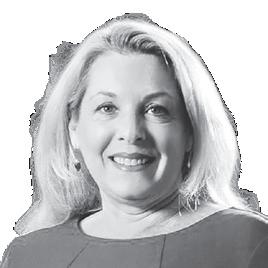
systems to try to present their findings to the WHO director. Miller created this framework so that no other health care worker would have to experience the helplessness of not knowing what to do with a human trafficking victim.
In speaking about the 9yearold trafficking victim, Miller says, “She’ll never know it, but she changed the course of my life.”

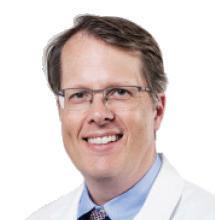
Dr. Jarett Berry has recently joined the School of Medicine team as the chairman of the Department of Medicine. ¶ He came to the School of Medicine from The University of Texas Southwestern Medical Center, where he was the principal investigator for the Dallas Heart Study, which he reengineered to focus on healthy aging. ¶ Now, as a part of the School of Medicine, he’s looking forward to combining his passion for cardiovascular prevention with rural health. When explaining what attracted him to the School of Medicine, he says “I am excited about the opportunity to expand my scientific interests in prevention to address the unmet need of health disparities in rural communities.„ ¶ Just weeks after joining the School of Medicine, Berry published a paper about novel strategies to prevent heart failure in highrisk patients, titled “Intensive Blood Pressure Lowering in Patients with Malignant Left Ventricular Hypertrophy.” ¶ Dr. Brigham Willis, School of Medicine dean, says, “Berry is a worldclass recruit, and we're thrilled to have him join our school. We're looking forward to seeing the many positive impacts he’ll have on health care for East Texans.”
THE UT TYLER School of Medicine recently hosted their inaugural Innovation Day, featuring renowned speakers from across the country. More than 100 people from around the region attended this event.
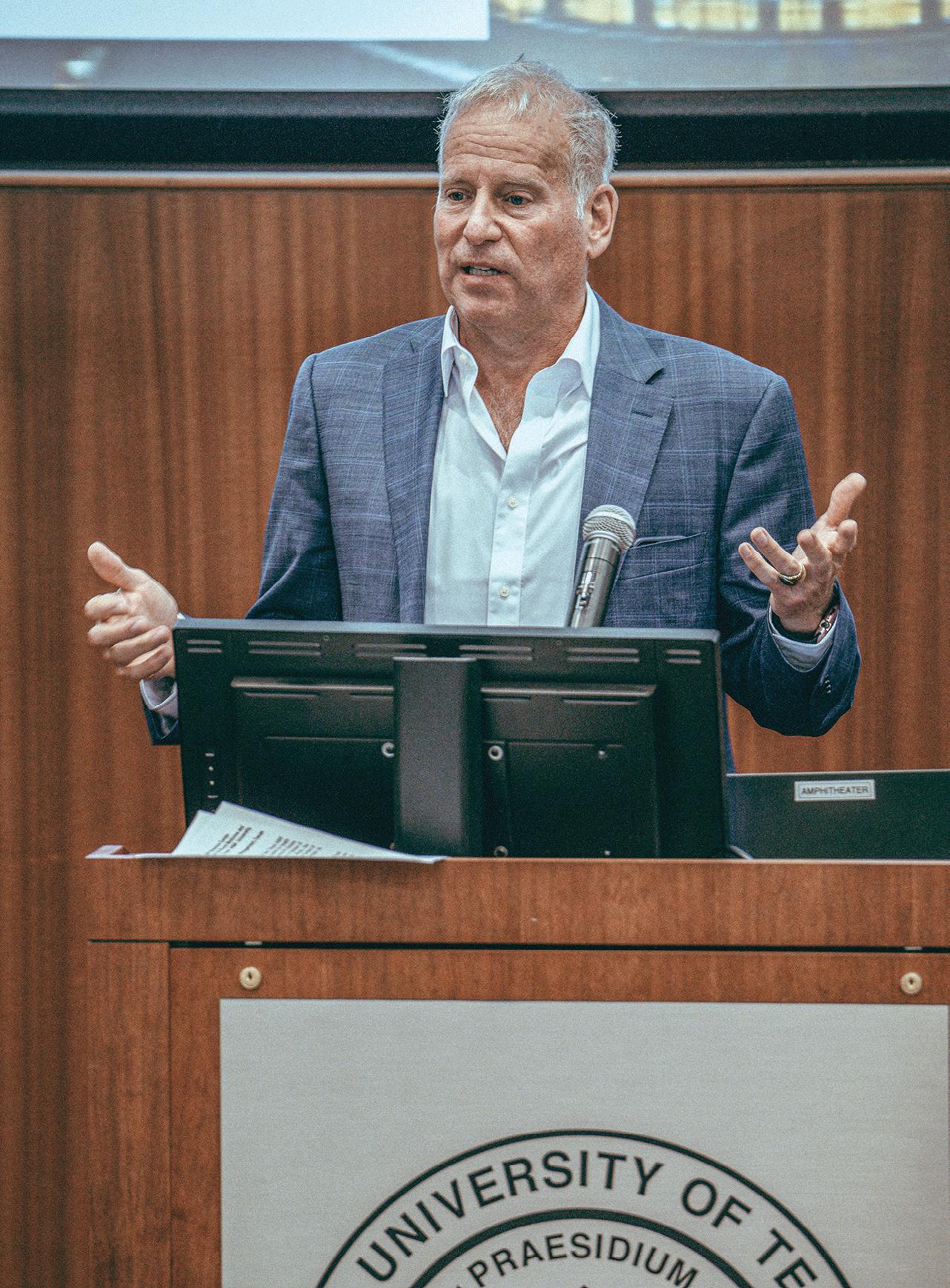
Dr. William E. Cohn, the inventor of the artificial heart, shared triumphs and difficulties he’d encountered while creating this medical innovation — along with other unprecedented inventions that revolutionized the health care industry.
Dr. Nancy Dickey, the first female president of the American Medical As
sociation and President Emeritus for the Texas A&M Health Science Center, participated in a conversation with Dr. Julie V. Philley, UT Tyler executive vice president for health affairs and vice provost, about the challenges and opportunities in rural medicine.
Dr. Joe Cunningham, co founder of Santé Ventures, discussed the bold steps required to make medical innovations happen. Dr. Tom Krummel, who transformed Stanford University into a top innovation engine, shared his experience in medical innovation.
Infant mortality is a crucial prob lem in East Texas. Out of the 254 counties in Texas, Smith Co unty ranks as the second highest in infant mortality. ¶ The Texas Home Visiting program aims to meet this vital need. The Health Resources and Service Admin istration grant of $7,187,500 was renewed recently, providing funding for this crucial program for another five years. ¶ The Nurse‑ Family Partnership nurses start working with low income, first time pregnant women early on in their pregnancy, and they continue meeting with the mothers until the child is 2 years old. Their goal is to help the mother reach full term pregnancy and ensure the child is at a healthy weight. ¶ While the program does aim to ensure the child is healthy, it also offers several benefits to the mother. Thanks to a different grant, the UT Tyler Health Science Center is the only THV site in Texas that offers eligible mothers 15 free therapy sessions addressing perinatal depre ssion. ¶ The mothers who have participated in this program have gone on to achieve signifi cant accomplishments: earning a driver's license, taking English classes, finishing their GED, completing a master's degree and even pursuing a career in nur sing. ¶ The goal of this program is to reach 175 women a year to promote healthy pregnancy, healthy births and health equity, and the renewal of the grant makes this possible. — EN

TODAY IT’S common to see someone sporting a wearable sensor like a Fitbit or Apple Watch. But a plant equipped with a fitness device? That’s something altogether different ... at least for now. If Dr. Shawana Tabassum has her way, plants will soon be equipped with their own wearable integrated fitness tracker, an invention she has dubbed the CropFIT.
An assistant professor of electrical engineering at UT Tyler, Tabassum conducts research into flexible and soft sensors, micro/nano optics, microfluidic devices and micro and nano electromechanical systems. The Crop FIT, she says, represents a merger between her doctoral and postdoctoral studies at Iowa State University.
As a doctoral student, Tabassum concentrated on devising optical sensors for agricultural uses such as gas monitoring in the field. As a postdoc, she turned her attention to developing point of care sensors for health care applications. “At the end of my postdoctoral training, I realized that I could create wearable sensors for agriculture,” she recalls. “It occurred to me that plants have organs that can be monitored as well — the leaf, the root, the stem — and I suddenly realized I had an opportunity to enter an unexplored area of research.”
Farmers currently lack the ability to gather hard, realtime data which would indicate if plants were stressed — be it from lack of water, nutrients, or pests — she continues. “I realized that if we could make a wearable sensor for plants, we could accomplish a great deal.”
The idea has energized Tabassum’s research since she joined the faculty at UT Tyler in 2020 and the concept is garnering national attention; her research is currently supported by a $200,000 National Science Foundation grant. Tabassum developed the CropFIT prototype, which she hopes to implement soon. “I’ve been doing initial experiments with the sensor in a garden behind the engineering building,” Tabassum explains. “The next step will be to test the sensors in a greenhouse or growth chamber, and then hopefully sometime next year my Texas A&M colleague and I will deploy sensors in a soybean or sorghum field.”
The field will be divided into different
segments, with one sensor deployed per segment, Tabassum explains. Initial experiments will require hand placement of the device, but ultimately the sensors will be deployed via robots or drones. The price per unit will be modest. “We anticipate that the entire device will cost less than $50 and will enable users to monitor temperature, humidity, soil salinity and the like. With this information in hand, farmers can respond to stressors that may be threatening their crops in real time, allowing them to contain costs for such things as fertilizer, water and pesticides more effectively while also maximizing their crop’s yield.”
Tabassum hopes that this research will spark interest among other scientists, particularly young women in STEM. “There are not many women in electrical engineering, a situation I’m always working to change,” she observes. In addition to hiring female undergraduate and graduate students to work in her laboratory,
Tabassum notes, she seeks to encourage women through her professional alliances.

For example, she recently chaired two women in tech sessions at the 2022 flagship conference of the IEEE Sensors Council, held in Dallas. One panel, a “Women in Sensors Program,” brought together female scientists in academia from the U.S., Asia and Europe to discuss current and future job opportunities in the field. Another, the “WiSe YP Big Idea Pitch Competition,” sought to encourage young students and researchers to bring an entrepreneurial mindset to their work in sensor research and development.
“Ours remains a maledominated profession and women are often discouraged from starting their own ventures,” notes Tabassum. “I’d love to see more women working in the techrelated side of our field, and I’m committed to doing whatever I can to encourage that shift.”
I ’ D LOVE TO SEE MORE WOMEN WORKING IN THE TECH-RELATED SIDE OF OUR FIELD, AND I ’ M COMMITTED TO DOING WHATEVER I CAN TO ENCOURAGE THAT SHIFT.
DR. SHAWANA TABASSUM
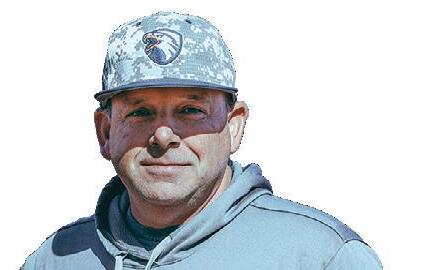
 BY RYAN SHUMAKER
BY RYAN SHUMAKER
THE DAWN OF a new era can bring uncertainties that limit those who are unprepared. Those who are prepared can quickly exceed expectations despite the uncertainties.
When The University of Texas at Tyler was officially accepted as a fullfledged NCAA Division II member on July 9, 2021, the immediate question was whether or not the Patriots could sustain the level of success the department maintained while competing at the NCAA Division III level. The new era of Patriot athletics at the NCAA Division II level would bring challenges, but the Patriots were prepared.
Athletics has immediately shown a strong measure of success at the Division II level that has far exceeded expectations, especially this early in the program’s DII history.
In UT Tyler’s first year of postseason eligibility:
• Softball earned its first trip to the NCAA Division II World Series after finishing the 2022 season as South Central Regional Champions and Division II National Semifinalists. The program was ranked third in the final 2022 NFCA Division II Top 25 Coaches Poll.
• Baseball participated for the first time in the 2022 Lone Star Conference Tournament.
• Volleyball made it to the South Central Regional Quarterfinals.
“Patriot Athletics has made a successful transition to Division II,” says Dr. Howard Patterson, vice president for athletics. “The foundation for success was put in place during our successful years in DIII. We can’t wait to continue our young, but rich, tradition of excellence on and off the field.”
A supportive institution, administration, highly skilled coaching staff and a strong professional support staff have made the transition possible. The student athletes’ commitment to their respective programs was evident throughout the transition, and the results have been nothing short of amazing, Patterson continues.
The athletic success that has immediately come to fruition has not been at the expense of academic excellence for the department. Studentathletes have continued to shine in the classroom despite the elevated emphasis on athletic competitiveness the new era Division II landscape has provided for the department.
UT Tyler was the first department with‑ in the Lone Star Conference to win both the men’s and women’s version of the LSC Academic Excellence Award in the same season in 2020-21.
• Twelve Patriot athletic programs have claimed Lone Star Conference Team Academic Championships.
• Baseball participated for the first time in the 2022 Lone Star Conference Tournament.



• 17 different student-athletes have been named to their respective Academic All-Region lists.
• 35 student-athletes have been named to Academic All-Lone Star Conference Teams.

The success both on the field of competition and in the classroom is no accident, as the framework and winning culture that propelled the program to national relevance at the Division III level was already firmly entrenched heading into the Division II era.
UT Tyler sponsors intercollegiate teams in 17 sports, including baseball, softball, volleyball, men’s and women’s basketball, cross country and golf. The athletics program helps studentathletes build their bodies and minds while learning to compete with integrity and honor.
UT Tyler was prepared for the new era, and the future is bright for the program. Go Patriots!



MMonths before the UT Tyler School of Medicine welcomes its inaugural class, President Kirk Calhoun is to the point as he considers the university’s ambitious plans to help advance health and education in East Texas.¶ “We’re busy,” he says without a trace of understatement. “When you open up possibilities, my experience is that good things flow from that. Certainly, the new medical school has been a game-changer for UT Tyler.” ¶ The School of Medicine — the 156th and one of the newest medical schools in the United States — isn’t the only big news to come out of UT Tyler. The university is undergoing its most significant transformation since being founded 51 years ago as a regional institution for higher learning. ¶ Consider the rest of the story:
THERE ARE PLANS to boost enrollment by 50%; create deeper partnerships with community colleges to improve higher education access in rural counties; and, significantly, UT Tyler will use its prestigious new research designation to do work — medical and otherwise — that can benefit the world.
“We have a new fiveyear strategic plan that I believe is very forward thinking in what we want to accomplish,” says Calhoun, a driving force who prefers to spread the credit. “I’ve been able to go out and recruit and retain good talent around me.”
One of those hires is Dr. Brigham Willis, the founding dean at the School of Medicine. Willis is a longtime educator, scholar and leader in academic medicine, having received the award for top educator at the University of California, Riverside in 2020 and 2021.
He will help lead a school of medicine that became reality when, in the fall of 2019, the University of Texas System Board of Regents voted to merge UT Tyler and the UT Health Science Center at Tyler into a single educational, research and clinical delivery facility in a region where many more physicians will be needed, due to coming retirements. The development made the UT Tyler School of Medicine the seventh medical school in the UT System.
“The Board of Regents had the vision to enhance resources for East Texas by creating a fully integrated university that will more comprehensively serve the region with exceptional learning, teaching, research and patient care,” says Kevin Eltife, chairman of the UT System Board of Regents and a former mayor of Tyler.
“The unification of the two institu
tions also establishes a clear pathway from undergraduate education to graduate and professional programs, especially in the health sciences,” he adds.
Willis is well aware of the challenges at hand.
Parts of the 35county East Texas region lack access to even a single provider. As the greater Tyler region ages, projections are that there will be a “sizable” shortage of physicians if there’s not a way to create a new doctor corps. The School of Medicine’s first class will include 40 students. Their selection will be deliberate and part of a calculated plan to meet the needs of rural and underserved areas.
“Our mission is to recruit students who were born and raised in East Texas, and train them to eventually become skilled physicians who will meet the rural health care needs here,” Willis says. “The University of Texas at Tyler School of Medicine aims to be part of that change.”
Even now, before the first cohort of medical students is able to don its white coats, the community is reaping benefits because of the presence of the medical school. The School of Medicine hosts a number of “lifestyle change programs” — from blood pressure management to Type 2 diabetes prevention, health challenges that are endemic to East Texas. Other outreach programs educate the community on a variety of health topics.
The School of Medicine is moving forward with a strong foundation: There are more than 16 residency and fellowship training programs embedded throughout the region, offering physicians training in such areas as internal and family medicine, psychiatry and surgery. The medical school, meanwhile, has brought speakers to campus from around the country to educate faculty about the latest innovations in medical technology.
Residents of East Texas will be the biggest beneficiaries.
“Community engagement is our top priority, and we will remain focused on our community in everything we do,” Willis says. “I’m excited to contribute to these efforts, and I know, without a doubt, that the impact of the School of Medicine on East Texas will continue to grow.”
Adds Dr. Julie Philley, executive vice president for health affairs and vice provost at UT Tyler: “We strive to partner and include the community in our efforts — especially with the advent of the School of Medicine — to improve health. Whether it be with local nonprofit organizations such as the East Texas Food Bank, St. Paul Children’s Services or other wellknown institutions, we believe that working together is the only path forward.”

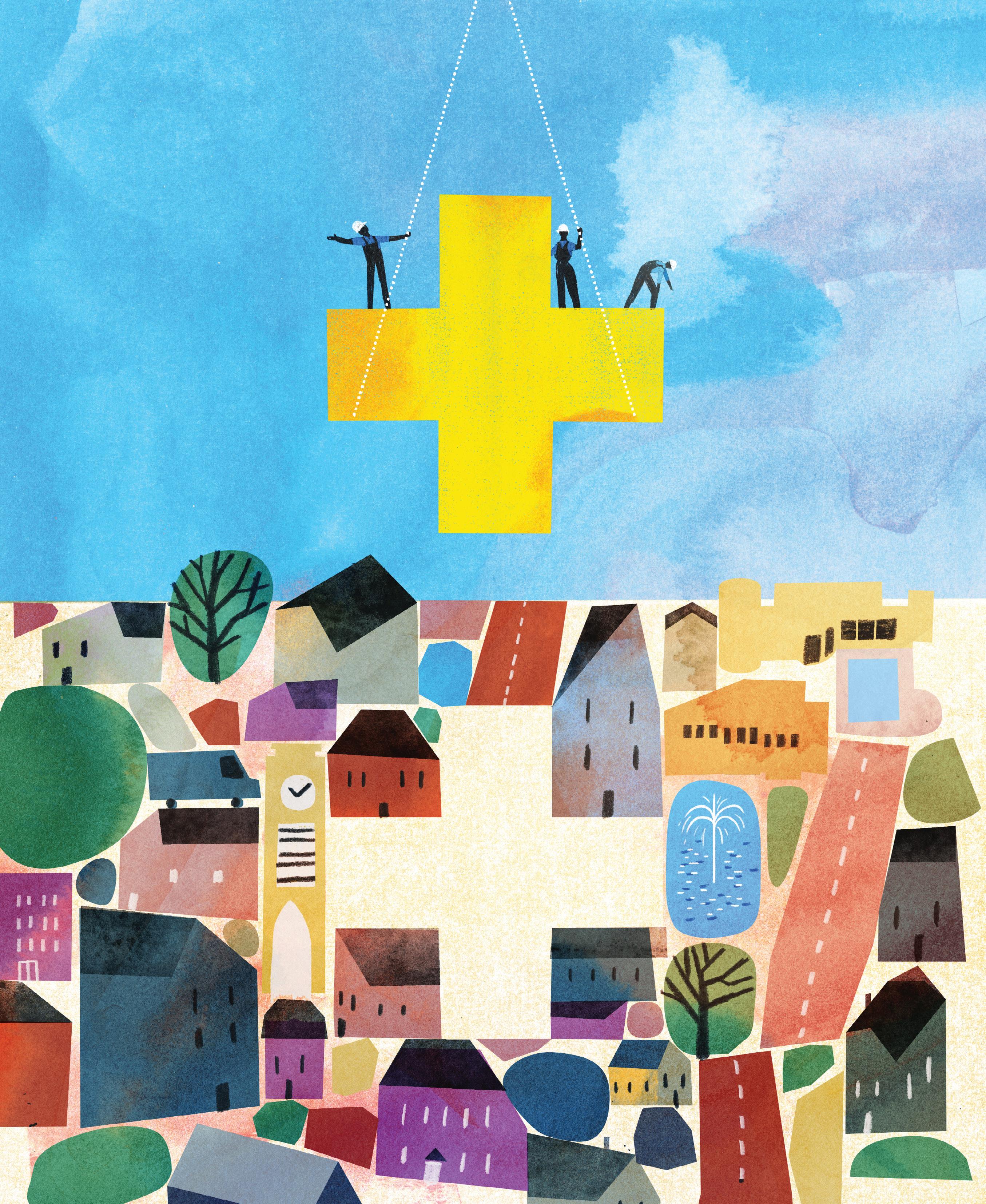
Clearly, the creation of the School of Medicine has raised UT Tyler’s profile in East Texas and nationally. The medical school is partnering with UT Health Houston, UT Rio Grande Valley, Rice University and the MD Anderson Cancer Center as part of the innovationdriven Clinical and Translational Science Awards Program. That effort seeks to efficiently turn research into readytouse interventions and treatments aimed at improving public health.
“Medical schools are big and exciting, and it brings a level of prestige to UT Tyler,” says Calhoun, who has led the newly consolidated UT Tyler since 2020 and was president of The University of Texas Health Science Center at Tyler from 2002–20. Calhoun is no stranger to medical pedagogy: He earned his medical degree from the University of Kansas, and he completed a fellowship in clinical nephrology, hypertension and metabolism at the University of Chicago.
Meanwhile, other forces are at play. Much of the university’s path forward centers on increasing enrollment from 10,000 to 15,000 students through improved retention strategies, expanded online program offerings and nurturing a better pipeline from community colleges. The move is driven by the idea that education is an engine for upward mobility and helps support industries throughout East Texas.
“Our guiding principle for growing our program portfolio is considering what occupations are needed in East Texas,” says Dr. Amir Mirmiran, executive vice president for academic affairs and provost at UT Tyler. “There are pretty much three areas: health related, education and technology.”
While UT Tyler has always worked with community colleges to expose prospective students to opportunities on campus, the latest effort doubles down on outreach — and is a concrete response to current trends. Sixty percent of East Texas residents who enroll at a fouryear university end up leaving the region to do so, Mirmiran says.
“We believe it is our responsibility to our region to provide services so that students don’t have to go somewhere else,” Mirmiran says. “We should be able to provide them with degree programs that they’re interested in and for which there is a need in our community.”
When members of the local community questioned why UT Tyler didn’t have a social work degree, the university developed an undergraduate degree. Efforts are now underway to add a master’s in social work. Similarly, UT Tyler is creat
ing a speechlanguage pathology degree.
“One of the advantages of the merger is that it allows us to expand our health care portfolio,” Mirmiran says. “So, for example, we currently have occupational therapy, and we hope to bring on board physical therapy, for which there’s so much demand in our region.
“Our community has a higher expectation of us now, and we have higher expectations of ourselves,” he adds. “While we have come a long way since UT Tyler was founded 50 years ago, there’s always more we can do. We’re empowered, and the community actually feels the same way.”
Raising awareness of offerings is now a heightened priority. UT Tyler academic counselors, as part of the College Readiness Program, go to high schools and community colleges to explain career “pathways” to wouldbe college students, while also helping them complete the Free Application for Federal Student Aid — or FAFSA — that could gain them funding toward a baccalaureate degree.
For some, there are formidable barriers toward seeking a higher education. Many can’t afford the cost, while for others, traveling great distances to Tyler is both time and costprohibitive. That’s why the university continues to develop its offcampus instructional sites at the Houston Engineering Center, Longview University Center and the Palestine Campus, while enhancing the online program portfolio.
colleges, the university has stepped up its outreach efforts exposing students to pathways that will outline plans for earning a bachelor’s degree or higher. Efforts are paying off. Freshman enrollment, for example, has increased in each of the last three years, Mirmiran says.
The merger has benefited UT Tyler in other ways. It helped the university gain coveted R2 status, a Carnegie Commission on Higher Education classification that denotes “high research activity.” Specifically, the classification signifies that a university has at least $5 million in research expenditures. UT Tyler far exceeds the threshold, with about $25 million in expenditures.
The distinction gives UT Tyler new standing in the research community, but more importantly it can help the university secure lucrative research funding from organizations such as the National Science Foundation. With an annual budget of $8.8 billion, NSF accounts for 27% of the total federal budget for basic research conducted at U.S. colleges and universities.
R2 is prompting the development of doctoral programs — such as one now being prepared for biomedical sciences, says Dr. Steven Idell, UT Tyler’s senior vice president for research. Before the merger, UT Health Science Center at Tyler did not award doctoral degrees.
“This is an exciting time with the medical school coming on board and programs expanding and realigning,” says Idell, who notes that when he arrived on campus 38 years ago, members of the university talked hopefully about a merger. Now that the day has arrived, look for even bigger things to come. UT Tyler could become an R1 institution — meaning “very high research activity” — within five years, Idell says.
Changes will necessitate the construction of new facilities — from the medical school itself, to expanded facilities for the School of Nursing. New and stateoftheart research labs also will be added to the campus landscape.
Watching it all enthusiastically is Scott Martinez, Tyler Economic Development Council president and CEO of the Tyler Area Chamber of Commerce. These are heady times in Tyler, and he likes what he sees.
Even before its first cohort of students, the medical school is helping improve lives through lifestyle change programs and other outreach initiatives.
In 2022, UT Tyler initiated the Patriot Promise Scholarship, which is funded by the UT System. The scholarship covers all tuition and mandatory fees for freshmen and transfer students who meet income requirements.
While there has always been a general linkage between UT Tyler and its partnering school districts and community
“If you want to build a great city, build a great university,” Martinez says. “The secret sauce to prosperous communities is higher education.”
Martinez is careful not to focus his excitement only on the medical school. “There’s a lot of depth in UT Tyler’s offerings, and there’s a lot taking place on that campus,” he says.
If you want to build a great city, build a great university. The secret sauce to prosperous communities is higher education.
SCOTT MARTINEZ, Tyler Economic Development Council President and Tyler Area Chamber of Commerce CEO

UT TYLER AND THE REGION TRANSFORMED WITH CREATION OF SCHOOL OF MEDICINE, AIMED TO BOOST THE HEALTH AND PROSPERITY OF EAST TEXAS. BY ANDREW FAUGHT

IN A REGION THAT BUILT ITS FORTUNES ON OIL AND GAS, UT Tyler is leading East Texas into a new and prosperous economic era for the 21st century.
That’s due in no small part to the creation of the university’s new School of Medicine, which operates alongside the UT Tyler Health Science Center and UT Health East Texas. The Association of American Medical Colleges calls medical schools and teaching hospitals “economic engines” that pump $728 billion, nearly 3.2% of the country’s total gross domestic product, into the national economy. They also support more than 7 million jobs.

In East Texas, the School of Medicine is ultimately expected to create in excess of $1 billion in annual economic activity in the region, according to analyst projections.
UT Tyler’s health care presence already was an economic force before the creation of the medical school: HSC and UTHET contribute 3,050 jobs and $278.3 million in annual gross product to the East Texas region, according to the Wacobased Perryman Group, which conducts economic analyses.
“Any time you place quality health care facilities in a region, you’re going to see a notable economic impact,” says Ray Perryman, the group’s president and CEO.
There’s a “multiplier effect” beyond the initial figures, Perryman notes. The economic benefits resulting from the first 10 classes of graduates — who are expected to remain in the area — could result in $760.4 million in annual gross product and 7,064 jobs in the Tyler region; the annual gross product balloons to $1.2 billion and nearly 11,000 jobs when considering the impact on East Texas at large.
Developments in Tyler and, in particular, some of the smaller nearby communities run counter to what’s seen in communities of a similar size elsewhere in the country.
“One of the most impressive things about the new medical school and UT Health East Texas is the quality of care and training provided across the region,” Perryman says. “At a time when many smaller population centers are struggling to maintain local access to health care, these facilities will help serve residents across East Texas.”
The region’s health care infrastructure, along with UT Tyler, “represent an economic force within the area,” Perryman writes in his executive summary.
The presence of a medical school will allow the region to better attract and retain doctors and other health care professionals, Perryman notes, and the combination of health care and educational resources could be a job creation catalyst in the region’s developing bioscience sector. He adds that Tyler has exceeded expectations for a community of just over 100,000 residents.
“It is unusual for an area of this size to have a large health care system able to partner with a university system to bring all of these resources together,” he says.
Perryman published his findings in a 2020 report titled “The Economic and Fiscal Benefits of The University of Texas Health Science Center at Tyler and UT Health East Texas to the Local Area, Surrounding Region, and Texas.”
The medical school builds on Smith County’s relative economic strengths. In 2021, the Tyler region outpaced the United States and all other Texas metro areas in job growth, according to the Tyler Economic Development Council. The city also ranks sixth in the United States for the largest gains in employment by metropolitan area, the U.S. Bureau of Labor reports.
Much of Tyler’s stability was due to employees working in crucial and varied sectors that didn’t experience heavy job losses – such as education and health care/social assistance. The medical school will further diversify the regional economy. Perryman calls the medical school’s impact on Tyler and East Texas “large and impressive.”
Part of that economic impact will be the result of a healthier populace. Rural Americans are more likely to die prematurely from heart disease, cancer, lung disease and stroke, according to the National Institutes of Health. Poverty, unemployment, low education and inadequate
transportation are contributing factors, NIH reports. Healthier populations require less sick days from work, resulting in less lost productivity.
As UT Tyler sets the economic and cultural tone for the region, the energy and enthusiasm are palpable along the downtown Tyler streetscape, says Mayor Don Warren.
“You’ll see college kids in the plaza eating their Andy’s custard and drinking coffee,” says Warren, noting that the city’s average age, according to the U.S. Census Bureau, has dropped to 34 years old in 2022, from 37 years old in 2010. “A lot of these young people are living downtown, and they’re creating bustle. People used to think of Tyler being a place to go and retire.”
IT'S
of UT Tyler, is helping to fuel development in town. The Morrison Lofts, a 112unit, highend apartment complex that opened in the summer, is completely occupied. A halfdozen other developments are under consideration for downtown, according to Warren.
“The young people are driving the train, and the older people are on the train giving guidance,” he says. “The vibe is real, and I don’t see it stopping anytime soon.”
Economic benefits are expected to carry over into counties neighboring Smith County, according to Dr. Manuel Reyes, acting director and senior research analyst at UT Tyler’s Hibbs Institute for Business and Economic Research. Census Bureau data from 2019 show that more than 44% of people who work in Smith County commute to the Tyler area from homes in adjacent counties.
East Texas is home to 1.1 million people in 23 counties. Fourteen of those counties, including Smith, make up the bulk of the region’s gross domestic product — $36 billion in 2021. That accounted for a 9.9% increase from 2020, Reyes says. Of that total, health care and social assistance contributed the largest portion of the Tylerarea GDP, $3.48 billion, he adds. The health care sector forms the backbone of the East Texas economy, accounting for 15% of the workforce.
The increased health care presence in Tyler will position as a destination point, while improving the health and economies of residents beyond the city’s boundaries, Reyes says.
“I see people coming from everywhere to study something related to health care, or to receive medical attention,” he adds. “There’s a ripple effect. The development in Tyler is helping these rural counties catch up.”
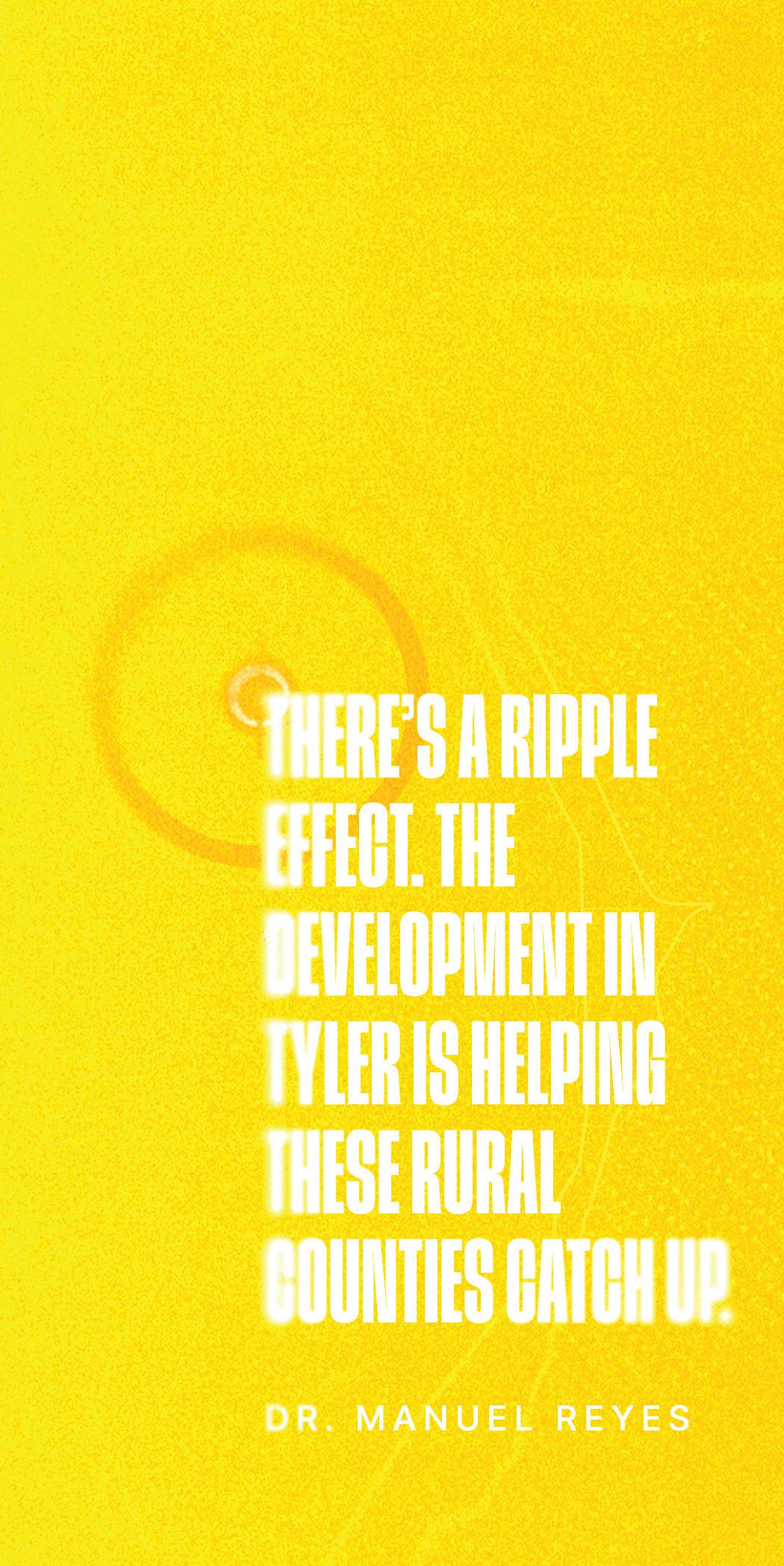
760.4
MILLION IN ANNUAL GROSS PRODUCT AND 7,064 JOBS ARE EXPECTED TO RESULT FROM THE SCHOOL OF MEDICINE'S FIRST 10 CLASSES OF GRADUATES
Medical schools and teaching hospitals pump roughly $728 billion into the national economy. And in the East Texas region: 1
BILLION IN ANNUAL ECONOMIC ACTIVITY IS EXPECTED FROM THE UT TYLER SCHOOL OF MEDICINE
3,050
JOBS AND $278.3 MILLION IN ANNUAL GROSS PRODUCT CONTRIBUTED BY THE UT TYLER HEALTH SCIENCE CENTER AND UT HEALTH EAST TEXAS
JOSH AND HOLLY SMALLWOOD TURN THEIR DREAM INTO REALITY WITH 80 ACRE MARKET
by Emily Battle
R E A C H I N G
MY DESTINATION ON AN EAST Texas farmtomarket road, I turn onto a driveway lined with majestic pines and focus in on the view ahead — a stately mansion surrounded by scenic landscapes. As I draw closer, there is much more to see. Hundreds of visitors mingling on the grounds. Families and friends gathering for photos. Children running and playing. Vendor booths, food trucks and live entertainment.
This is 80 Acre Market, owned by UT Tyler alumni Josh and Holly Smallwood. Last year, they turned their former residence between Longview and Gilmer into a shopping and recreational venue for East Texas families to enjoy. But the venue, open every other weekend, also attracts visitors from other parts of Texas and several other states. Over 2,000 visitors make their way to the 80 acres each market weekend.
The market is only the latest venture for Josh Smallwood since graduating with honors from UT Tyler with his Bachelor of Business Administration in accounting in 2010 and Master of Business Administration in 2011.
He began building rustic picture frames in 2012 with one employee and has turned it into a $100 million business that designs and manufactures home décor and textile products. Known as Smallwoods, the e commerce based company employs over 400 people locally and
ships products to all 50 states and Canada from its Longview distribution center. Smallwood family enterprises also include SweetHoney, an online children’s clothing business with customers across the U.S. It was founded in 2012 by Holly Smallwood, a 2008 Bachelor of Science in Nursing graduate and 2015 Distinguished Alumni honoree. The company name was inspired by the nickname of one of the Smallwoods’ five children.
Talking with Josh Smallwood a few days prior to my visit to 80 Acre Market, I discover a common thread throughout his story — the importance of family and community.
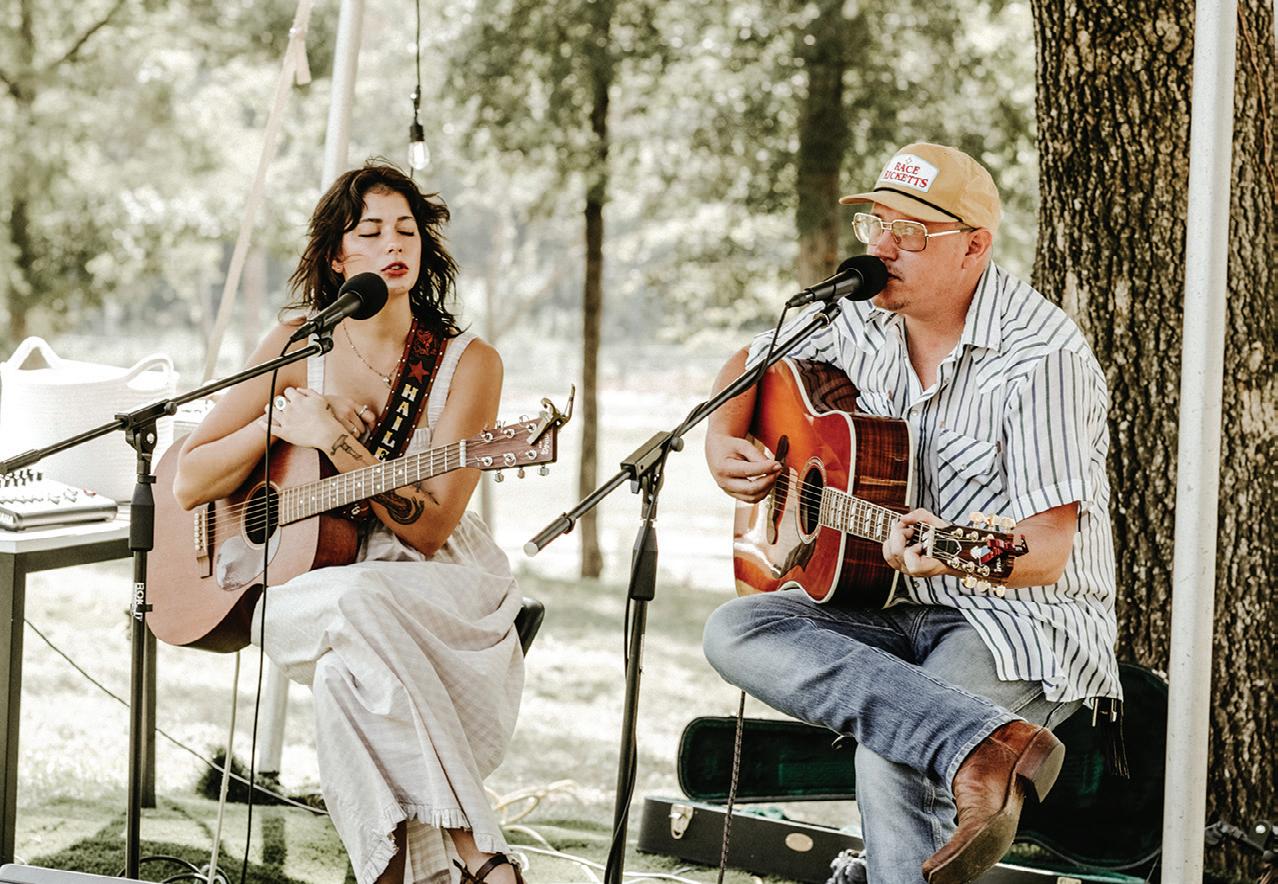
During childhood, the East Texas native and his older brother went to live with their grandparents on their Kilgore farm due to family circumstances. Their grandparents were of limited financial means but provided stability for the brothers, who also received an outpouring of community support. Neighboring families helped with food and the boys’ transportation to extracurricular activities.
“Our parents were out of our lives early on, but we didn’t feel like we were missing out because our grandparents were very giving to us and we had so many people within our community who always included us,’’ Smallwood says. “We had this network of relationships with different families who were happy to help.’’ Smallwood has fond memories of life on the farm. There was always work to be done, but the 100 acres with its hay mead
ows and ponds was also a fun place to play and enjoy the outdoors. In fact, he was drawn to the land where 80 Acre Market now stands because it reminded him of those childhood experiences. He also learned the value of hard work from his grandfather, for whom Ronnie Brown Road in Kilgore is named. “My grandfather was kind of a jackofalltrades. He raised cattle, raised chickens, ran a butcher shop and he was a contractor laying waterlines for the city. It was thrilling to see how he had a variety of things that kept him motivated and interested,’’ he says.
Smallwood married after high school and began attending junior college, transferring to UT Tyler as a sophomore when the university offered him a scholarship. He recalls finding a supportive learning community in the Soules College of Business.
“I definitely received a toplevel education coupled with great access to professors. Many of my instructors were working in their fields aside from teaching and brought an enormous amount of realworld experience to our classes,’’ he says. “They also knew me on a firstname basis and were available to help anytime I was challenged in my coursework. I’m sure I could call them today if I needed to know something in particular and they’d be more than willing to help.’’
Dr. Mary Fischer, UT Tyler professor of accounting, remembers Smallwood as
an overachiever who took more than the minimum fulltime course load and excelled in both undergraduate and graduate studies. “He was outstanding as an accounting major, performing very well in difficult courses; and he graduated magna cum laude, which is not easy to achieve,’’ she says.
Early on as an undergraduate, Smallwood was able to enhance his classroom learning through an internship with a Tyler accounting firm. The internship evolved into a fulltime position that he held — along with a couple of parttime jobs — while continuing his undergraduate and graduate studies. After completing his MBA, Smallwood stayed with the accounting firm for about a year, until receiving a business opportunity that would alter the course of his life.
As one of his jobs after graduation, Smallwood helped produce Westernstyle wall art, making rustic frames out of barnwood. Given the opportunity, he purchased the business in 2012 and worked diligently to make it his own. Using social media as a platform to reach mass markets, he began allowing customers to upload their own art and photos online for custom framing.

By 2015, Smallwoods had evolved from a two man operation to 60 employees, spread out over several area facilities. That year, the company purchased and renovated a former grocery store in nearby Diana to serve as its headquarters.
At last, all of its operations were located under one roof — until September 2017, when the building was destroyed by an overnight fire. But Smallwoods quickly regained its momentum with the help of staffers, vendors and suppliers, and backup equipment the company had stored offsite. Within a week, operations were up and running again in various area locations.
“I remember looking around at the people involved in the effort and being so proud. It took a community rallying around us, both internally and externally, to rebuild in a short amount of time,’’ says Smallwood, who values a closeknit community within the company and refers to staff as work family.
Smallwoods grew from 60 to 200 staffers within a year after the fire and was making strides toward becoming the operation that it is today. The company is now constructing a 1millionsquarefoot facility on land near 80 Acre Market to house its operations and allow for growth.
Seeing a need for more family oriented venues, the Smallwoods established 80 Acre Market as a way to give back to local communities, providing families an opportunity to enjoy free space and time together.
The market is unique to East Texas, including locallyproduced retail items as well as regional vendors, food trucks and live entertainment, and often serves as a launching pad for new businesses and performers.
On the day of my visit, I prepare to walk the short distance from the parking lot to the mansion, but a staffer pulls up in a golf cart and kindly offers me a ride. This is one of the many accommodations offered to those who visit. “We want to have that extra touch that people might not get elsewhere,’’ Ashley Nichols, chief of staff, explains. She says the goal is for visitors to enjoy the day stressfree.
Repurposed as a retail space, the house is filled with shoppers and stocked with a variety of wares, from home furnishings, apparel and gift items to pastries and chocolates. When the Smallwoods set out to create a community venue, Nichols says, “they began with the idea of a store and then expanded to the grounds to have a place for families to come and feel free to relax. If you want to shop in
the store, great. If not, there are free activities outside for everyone.’’
Across the expansive grounds, I see activities in every direction. Guests are chatting in groups, visiting vendor booths, placing their orders at food trucks and dining at picnic tables. Others are relaxing in lawn chairs, listening to live music.
Children are doing what they enjoy as well, playing yard games built by ranch staff, getting their faces painted, being creative in the arts and crafts tent, and having fun in bounce houses. And for adults who prefer not to shop or participate in activities, there is a “man cave” tent with football games on big screen TVs. Store offerings and outdoor events change every market weekend to provide a different experience each time, Nichols notes.
Visitors often give feedback, and the most typical comment is “ ‘This is what East Texas needed,’ ’’ Nichols says, adding that several on staff were visitors first. “They came and then wanted to join us — we consider that the greatest stamp of approval.’’
80 Acre Market is named for the original acreage where the Smallwoods built their home, but surrounding land has been purchased for future plans, which include walking trails, fishing ponds and a swimming facility the size of a football stadium. The property has expanded from 80 to 240 acres, so there’s plenty of room for growth.
FIVE QUESTIONS
 INTERVIEW BY HANNAH BUCHANAN
INTERVIEW BY HANNAH BUCHANAN
WHILE AN INTERN at The University of Texas MD Anderson Cancer Center, FatimaAntonia Delgado saw a robotic arm perform surgery. She knew at that moment she wanted to become an engineer. At The University of Texas at Tyler, she discovered both an affordable pathway to reach her dream and encouragement along the way.
The Houston native credits UT Tyler and its partnership with Houston Community College for her career success. The firstgeneration college student graduated from the UT Tyler Houston Engineering Center in May 2022 with a Bachelor of Science
degree in mechanical engineering. Delgado would land the opportunity of a lifetime upon graduation and now lives out her dream — working as a quality engineer at Boeing, the world’s largest aerospace/ defense company.
Shortly after starting at Boeing, Delgado was named the 2022 American Institute of Aeronautics and Astronautics’ Aviation Diversity Scholar. The young engineer was also recently elected to the Boeing Familia San Antonio Board. She looks forward to expanding her knowledge in aviation and contributing her talents in the aerospace industry.

UT TYLER MAG: If your life were a story, what would it be titled?
FATIMA DELGADO: Aim for the Stars
UTTM: What's one thing you have learned about yourself that you didn't know 10 years ago?
FD: I have learned it is better to take a chance and fail than to not try at all. I believe my past failures shaped me to be the fear less person I am today. I learned life is not always easy but with hard work and sacrifice, I am capable of getting where I want to be. When I decided to go into STEM, many people advised me not to because I was “not going to make it.’’ I learned that no one else’s opinion has significance in my life. God can give me the strength to go through anything.
UTTM: What are your fav‑ orite memories of your experience at UT Tyler HEC ?
FD: I loved coming together with other engineering majors to study and find ways to broaden our knowledge. I cherished my time as president of the American So ciety of Mechanical Engineers. I am beyond grateful to Dr. (Andres) Garcia for ensuring that students had every resource to be success ful. Professor Aws Al Shalash was always encouraging and push ing me to new levels. Another fa vorite memory is when I decided to pursue a career in aerospace. I told Mr. (Mark) Stark (career success coach), and he fully believed in me and helped me to go into the field.
UTTM: What are you most grateful for?
FD: I am most grateful for God blessing me with a wonderful family and filling my life with so many amazing professors and friends from UT Tyler. I am beyond grateful for having amazing parents who made sacrifices in their lives to give me the opportunity for a better one.
UTTM: What are you currently watching or reading?
FD: I enjoy watching Madam Sec‑ retary! I love seeing Elizabeth McCord being powerful and strong.
1982
Valaria Dobson Staab (BBA Marketing) was promoted to chairman of NBC Universal Local, including NBC Owned Television Stations, NBC Sports Regional Networks and Telemundo Station Group. A broadcast veteran of over 35 years, she joined NBCUniversal in 2011.
1987
Stewart Fillmore (BBA accounting) authored the true crime story “Tenaha: Corruption and CoverUp in Small Town Texas,’’ after retiring from a 29 year career with the FBI. He also is a contributor to television programs and podcasts.
1989
Colleen Millslagle (BSEd reading education) has been the owner of Success Learning Center in Tyler since 2001. She works with adults and children who have dyslexia, dyscalculia, dysgraphia, auditory processing issues and ADD/ADHD.
1995
Melinda Beatty (BBA management) was promoted to compliance/CRA officer for theLongviewbasedTexasBankandTrust Co. Her previous positions with the bank include assistant compliance officer.
1998
Donesa Walker (MEd reading education) owner/operator of LearningRx, was recognized by Marquis Who's Who for excellence in education. Walker has served as a teacher and reading specialist for more than 20 years.
1999
Monica Aldama (MBA) is a cheerleading coach, author and TV personality best known for the online docuseries “Cheer,’’ which chronicles the struggles and dynamics of the 2019 Navarro College coed cheerleading team.
2000
Anthony Boone (BS criminal justice) was named police chief of the Longview Police Department. Boone joined LPD in 2001 and was promoted to lieutenant in 2008 and assistant chief in 2015.
2002
Nancy Arellano Rangel (BBA marketing; MS human resource development, 2013) was a Women with a Voice honoree. She is president and CEO of the Tyler Hispanic Business Alliance. Continued on p. 38
Alumni literary picks full of intrigue that will keep you turning the page.
 BY BEN MACINTYRE
BY BEN MACINTYRE
The thrill of high stakes espionage, the politics of Cold War Europe and Russia — the true story about Soviet double agent Oleg Gordievsky is astonishing. It proves that one person really can have a huge impact on world history … and it be kept a secret for years.
– SARAH DRAPER16
Following an old fisherman on the hardest fishing trip of his life, it is a beautiful tale of unrelenting hope in the face of trials. I also love how Hemingway’s descriptive language transports you into the book and makes you feel like you’re there, in the boat.
 – KATHERINE “KC” JENNINGS 22
– KATHERINE “KC” JENNINGS 22
 BY MARIA SHARAPOVA
BY MARIA SHARAPOVA
She came to America from Russia with little money as a kid and became the youngest Wimbledon champion at 17 years old. This book is very honest and real. –
GABRIEL HIDALGO20
I’m always looking for new books for my younger clients, and this is one of my new favorites. It shows kids what it’s like to be a refugee and how to show empathy for someone else's situation in life.
 – COLLEEN MILLSLAGLE 89
– COLLEEN MILLSLAGLE 89
I found myself reading a lot in 2022 and this was a standout—a very different read, about trying to make your own future despite challenges. This book takes you on a serious emotional journey. – ADDIE

’ 16
MOOREUT TYLER GRADUATES Mike Clendenin ’99 and Lance Hibbeler ’06 have at least two things in common. While both have gone far in their careers as mechanical engineers, they also maintain close connections to their alma mater.
Both alums recently presented gifts to the university to support the success of current and future students pursuing engineering degrees.
Clendenin leads Tylerbased EMA Engineering and Consulting as president and CEO and was instrumental in the company gifting $100,000 to create an endowment supporting special projects of the College of Engineering. The donation also will name the Ratliff Engineering Building South’s fourth floor terrace the EMA Engineering and Consulting Terrace.
Hibbeler, an engineer at Intel Corp. in Portland, Oregon, gifted $150,000 to support Department of Mechanical Engineering programs and name the Lance C. Hibbeler Materials Testing Laboratory.
“Mike and Lance are prime examples of alumni who have gone on to become very successful in their careers while also passionately supporting the college and the success of future engineers,’’ says Dr.
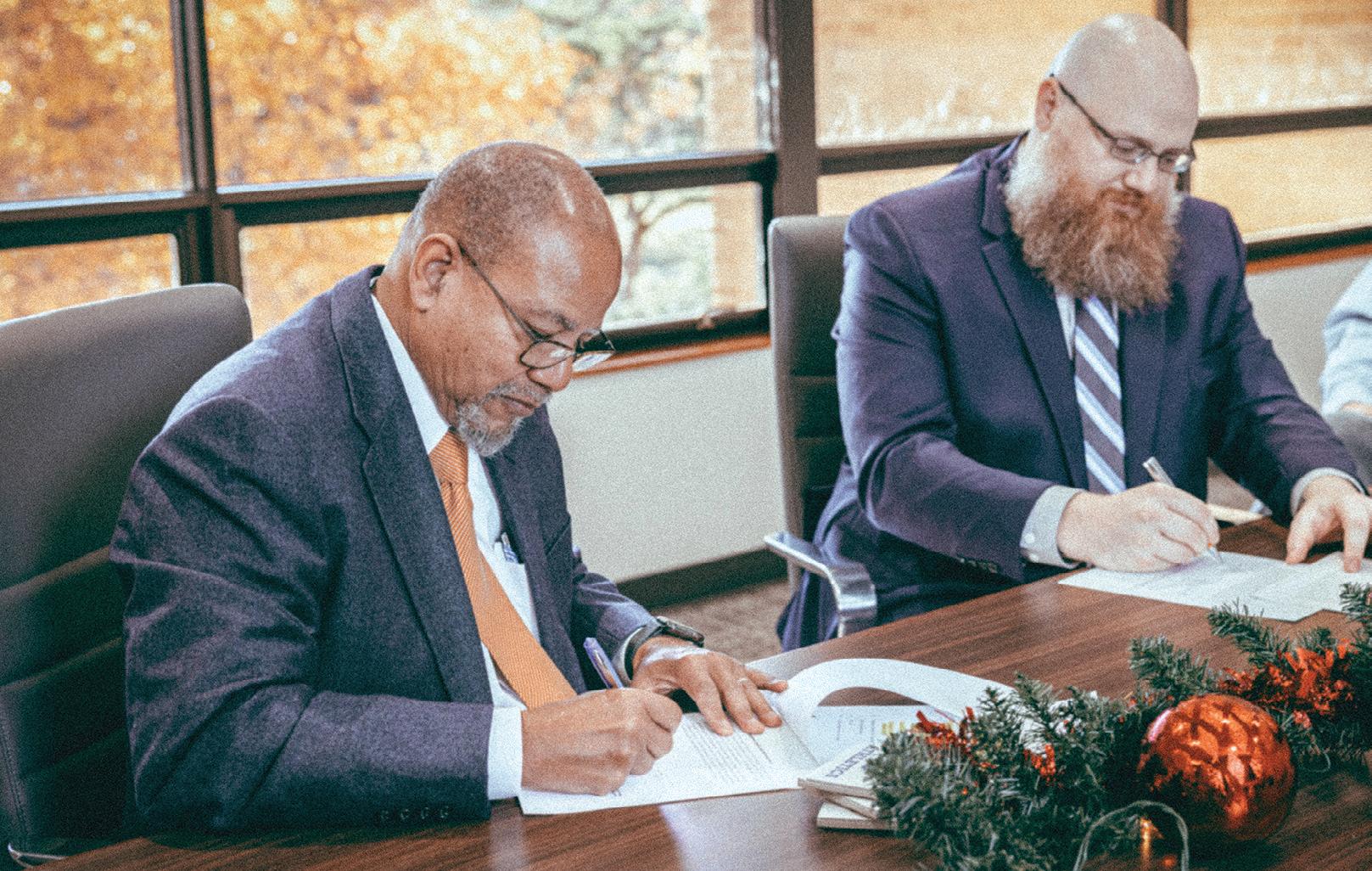
Javier Kypuros, College of Engineering dean. “These generous gifts will impact student learning and career readiness for many years to come.’’
The new EMA Engineering and Consulting Dean’s Legacy Projects Endowment will support College of Engineering infrastructure and facility needs, which are often designed by students. Legacy projects enable the college to make critical enhancements to its facilities while engaging students in firsthand experiences for career readiness.
“This was a gift to the College of Engineering, but it was also an investment in the future of our company,’’ Clendenin says, noting that the mechanical, electrical and plumbing engineering firm employs more than 30 UT Tyler graduates as well as student interns. “If not for the UT Tyler College of Engineering, EMA would not be where we are today,’’ he says. “I see it as the life blood of our future, so we’re very excited to lend our support.’’
Clendenin grew up in Tyler, graduated from high school in Tyler Independent
School District and then attended Tyler Junior College. He enrolled at UT Tyler when the university began offering engineering degrees.
“I was always aware of the university but always thought I would pursue engineering, so UT Tyler wasn’t an option until 1997,’’ he says. “At the time, I was working as an intern for EMA and taking classes at TJC with plans to most likely go to Texas A&M. When UT Tyler announced there would be an engineering program starting, I decided to stay in Tyler and work for EMA parttime through college. The timing could not have been better for me.’’
One the first graduates of the mechanical engineering program, Clendenin has served on the Department of Mechanical Engineering Industrial Advisory Board and the college’s Advisory Council. He was honored as a UT Tyler College of Engineering Distinguished Alumnus in 2020.
Hibbeler’s gift to the university will provide enhancements to the Department of Mechanical Engineering and what is now the Hibbeler Materials Testing Laboratory. The facility is used by students in laboratory classes, including Materials Science, Introduction to Manufacturing and Engineering Design.
“I hope that the funds will be used to make the lab better and cause future students to share my love of the subject matter,’’ Hibbeler says. “The entire human race comes out ahead when we have more passionate engineers working to solve the world’s problems.’’
At Intel, Hibbeler uses computational process modeling to help design, develop and debug the chipmaking process. He has received substantial recognition at the departmental, divisional and business unit levels for his work, and credits the university for his success.
“I was able to get admitted and graduate from one of the top engineering schools in the world for my graduate studies and then find employment at a tech company, all with the educational foundation I received at UT Tyler,’’ he says.
After graduating summa cum laude from UT Tyler, Hibbeler attended the University of Illinois, earning master’s degrees in mechanical engineering and theoretical and applied mechanics, and a doctorate in mechanical engineering.
His involvement as a UT Tyler alum includes speaking to students at the university’s Career Success Conference.
FORMER STUDENT HONORED FOR OUTSTANDING WORK ON UT TYLER FACULTY.
By Hannah BuchananUT TYLER ALUM and faculty member
Ashley Dalby (MS kinesiology, 2012) has been recognized as one of the best educators in the UT System.
A lecturer in health and kinesiology, she earned the 2022 UT System Regents’ Outstanding Teaching Award in recognition of extraordinary classroom performance, innovation and commitment to student success through teaching.
Established in 2008, the Regents’ Outstanding Teaching Awards reinforces the Board of Regents’ commitment to ensuring that University of Texas institutions are places of intellectual exploration and discovery, educational excellence and unparalleled opportunity.
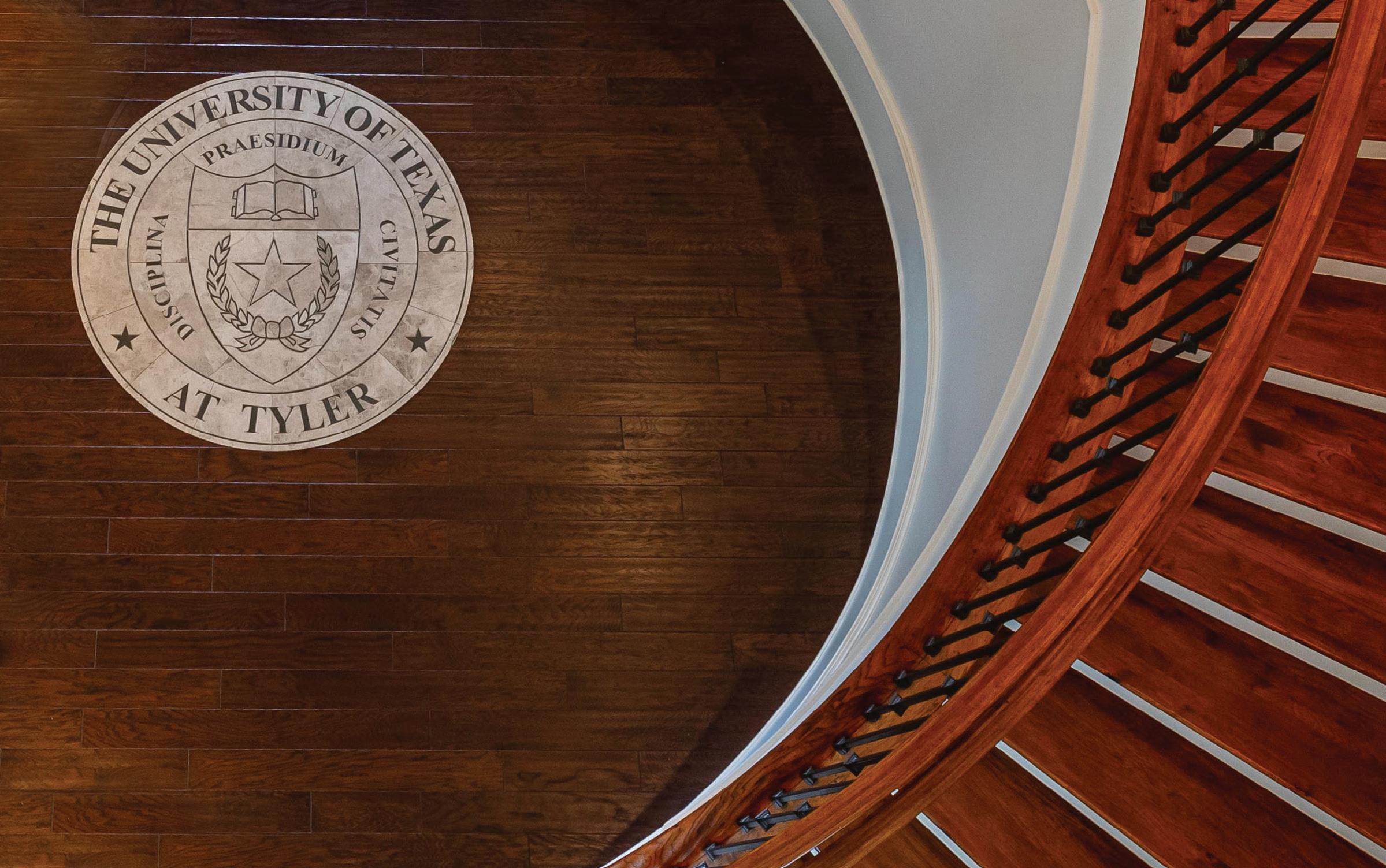
“The UT System Board of Regents is honored to recognize top educators annually for their extraordinary dedication to the students they are equipping to be our future leaders,” Board of Regents Chairman Kevin P. Eltife says.
Dalby joined UT Tyler’s School of Health Professions as a lecturer for the Department of Kinesiology in 2019. She also serves as coordinator for the UT Tyler Lifespan Wellness Research Center. An American College of Sports Medicine certified exercise physiologist and cancer exercise trainer, she applies her dedication and expertise in exercise science toward teaching and research as well as student and community engagement.
She was instrumental in establishing a FitSteps for Life® exercise location on the UT Tyler main campus. As UT Tyler’s founding FSFL supervisor, Dalby guides both graduate and undergraduate students in implementing specialized exercise prescriptions for community members with cancer and other chronic illnesses.
As a faculty adviser, she led a team of undergraduate kinesiology students to UT Tyler’s firstever state victory at the 2022 Texas
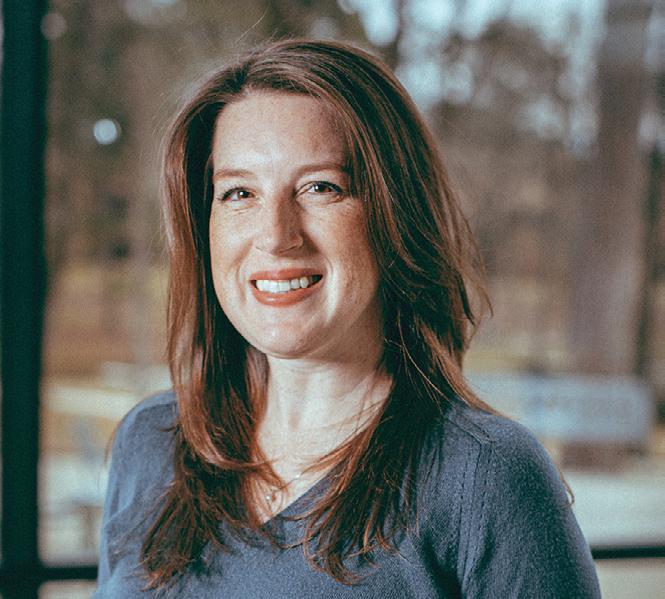
ACSM Conference “Student Bowl” competition, in which collegiate teams answer Jeopardytype questions about exercise science.
Dalby is currently pursuing a UT Tyler Master of Science degree in biology.
Nominees for Regents’ Outstanding Teaching Awards undergo a series of rigorous evaluations by students, peer faculty and external reviewers. The review panels consider a range of activities and criteria in their evaluations of a candidate's teaching performance, including classroom expertise, curricula quality and student learning outcomes.
If UT Tyler is named in your will or trust or as a beneficiary of life insurance or retirement for $25,000 or more, you can create a legacy by naming a scholarship for yourself or anyone you choose to honor.
You can even create your scholarship endowment now and grow
Let
help you plan your gift. We
2002
Monica Simmons (MEd; BSIS teacher preparation, 2000) was named superintendent of schools for Elysian Fields Independent School District. She has worked for the district since 2002 as a teacher and administrator, and became assistant superintendent in 2021.
2004
Brian Ballew (BA history), a senior associate attorney with Beal Law Firm PLLC, is now certified in family law by the Texas Board of Legal Specialization. Ballew also received the State Bar of Texas Star of Achievement Award.
2006
Ralph Cottrell (BS industrial technology) was hired as an instructor in diesel equipment technology at Texas State Technical College’s Marshall campus. Cottrell previously worked in the diesel equipment industry.
2008
Cameron Cooper (BBA marketing) was hired as East Texas commercial banking relationship manager for Regions Bank of Tyler. Cooper spent 14 years in the DallasFort Worth banking industry, serving national and international clients.
Geoffrey Sherman (BS history; MEd educational leadership, 2010) is the new principal of Tyler Legacy High School. He previously served as Hubbard Middle School principal, receiving Tyler Independent School District’s 2022 Principal of the Year in that role.
2009
Brian Nix (BBA finance; MBA, 2012) was named chief lending/chief credit officer of Citizens Bank of Tyler. He was market director of commercial lending with Spirit of Texas Bank before joining Citizens Bank.
2010
Jordan Yutzy (BS civil engineering) was named city manager of Española, New Mexico. He previously served as city manager of Eunice, New Mexico, director of public and community services for Jacksonville, Texas, and traffic engineer for Tyler.
2011
Sarah Yosten Collins (BA journalism) is the communications and marketing manager for Next Step Community So
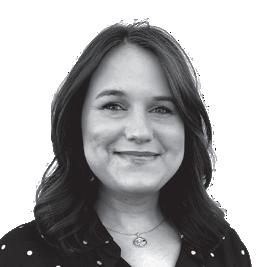

Sarah Yosten Collins ’11 details how she’s never more than two taps away from completing any task. everyday tasks!
I AM I love this app to help me with my mental health! Life can be busy, and I love that this app sends affirmations to me throughout the day.

lutions, a Tylerbased nonprofit that promotes hope, help and strength among youth in Texas.

Joseph Yazdanpanahi (BS economics; MBA, 2018) was hired as director of information technology for the city of Forney. He previously served as director of information technology for Sunnyvale and chief information officer for Jacksonville.
Crystal Savage Traylor (BBA marketing) is an author and analyst. She recently published the second volume of “More Than Me,’’ an urban fantasy novel series.
Dr. Paula Anthony-McMann (PhD huan resource development) was reappointed by Gov. Gregg Abbott to the Texas Health Service Authority Board of Directors. She is chief strategy officer of UT alth East Texas and an adjunct lecturer at UT Tyler.
Clint Jones (BS civil engineering) was ointed by the Texas Department of Transportation’s Lufkin District to serve as Livingstonarea engineer. Jones became an engineer in training with the district in 2014.
Sarah Draper (BA English and mass communications) was hired as a fifthgrade teacher at Tyler Classical Academy. She previously served as a missions worker in Europe and the Middle East, and as an academic adviser at UT Tyler and Tyler Junior College.
Addie Moore (BA art history) is marketing and communications coordinator for CulturalDC, an arts nonprofit based in Washington, D.C. She is an interdisciplinary artist and will be featured in two upcoming exhibitions, the “ArtHash X Kettle Art Show’’ and “The Ones That Got Away.”
Miles Zeorlin (BS mass communications) was hired as a real estate sales consultant for Niseko Real Estate in Niseko, Japan. He is also a co founder, marketing director and member of the board of directors of the nonprofit Niseko Area Mountain Bike Association (NAMTBA.com).
McKenzie Hugghins (BSIS teacher preparation) was honored as 2022 Teacher of the Year at Owens Elementary School in Tyler. She teaches second grade mathematics and science.
Corey Pleasant (BBA) joined Texas Republic Bank as a banking officer/branch operations supervisor in Richardson. In his spare time, Pleasant volunteers with Feed the City, providing support to families in need.

Dr. Emily Brooks (DNP) was hired as a nursing excellence client advocate at Tipton Health, a nursecentric consultancy based in Newark, Delaware. She is the primary client liaison responsible for guiding hospital nursing teams.
Erin Thibodeaux (MEd educational leadership) was named principal of Brenham Middle School, after serving as assistant principal.
2020
Gabriel Hidalgo (BBA marketing) is a contracts administrator at Vitol, an oil and gas trading firm. He previously served as assistant tennis coach at Angelo State University, where he earned his MBA in 2022.
2021
Hailee Hollan (BS biochemistry) was named head softball coach at New Diana High School, where she teaches forensics and anatomy, and physiology.
Stephanie Martinez-Arndt (MBA) was hired by Pixar Animation Studios as a coordinator of production management, feature relations and marketing. She joined Pixar following a series of internships in the entertainment industry.
Ali Seilheimer (MEd educational leadership) was named dean of instruction at Brenham Junior High School, after serving as reading instructional coach. She has worked in education for 14 years, including five in the Brenham school district.
2022
Katherine “KC’’ Jennings (BS economics, BBA accounting) is attending law school at Pennsylvania State University. She is pursuing a legal career with a particular interest in higher education law.
The UT Tyler R. Don Cowan Fine and Performing Arts Center marked its 25th anniversary with a blacktie gala featuring actor, filmmaker and musician Kevin Costner. “An Evening with Kevin Costner” included a talk with the Academy Awardwinning actor who shared stories and anecdotes from his more than fourdecade career.
Costner is known for such notable films as “Dances with Wolves,” for which he won two Academy Awards, “JFK,” “The Bodyguard” and “Field of Dreams.”
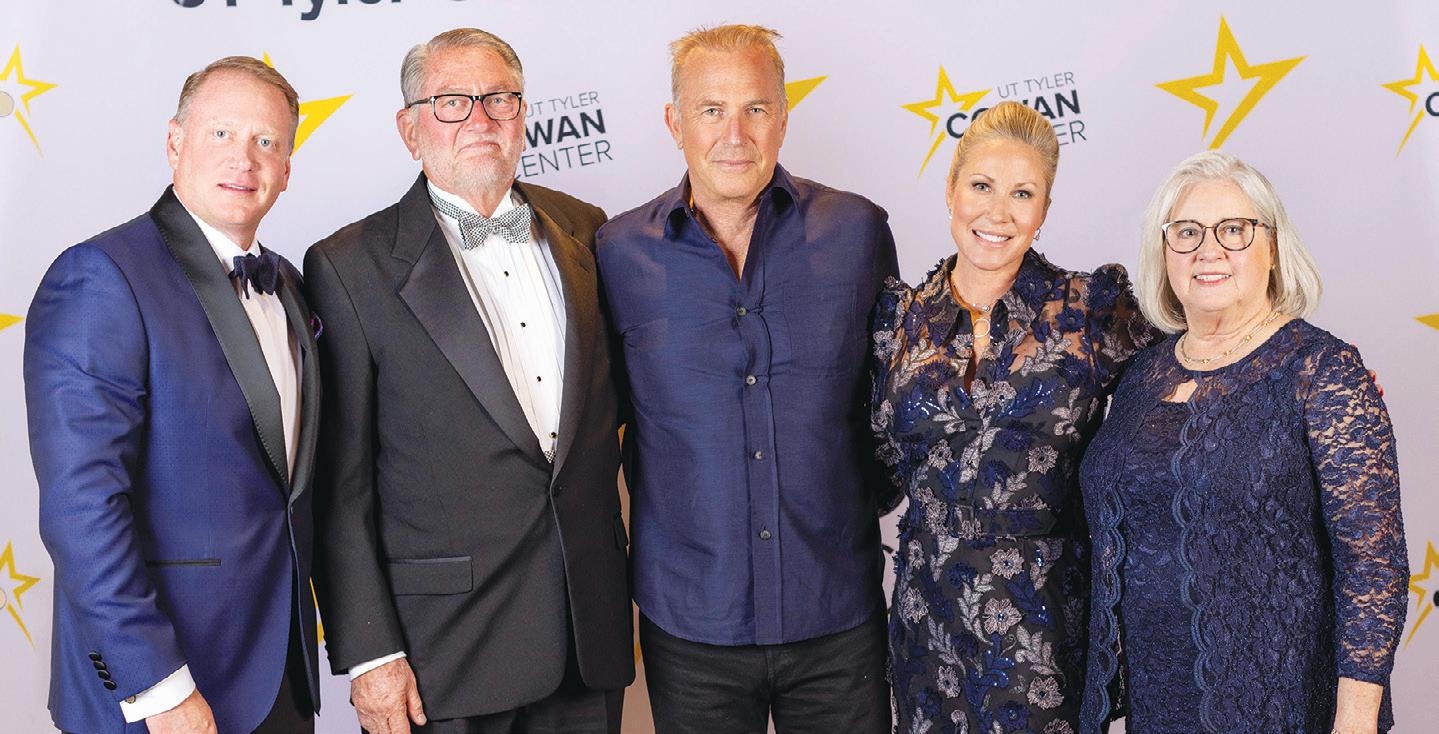
Known to many as a shark on the popular TV series “Shark Tank,” Daymond John spoke Oct. 4, 2022, at the UT Tyler R. Don Cowan Fine and Performing Arts Center. He was the first speaker of the 202223 Distinguished Lecture Series.
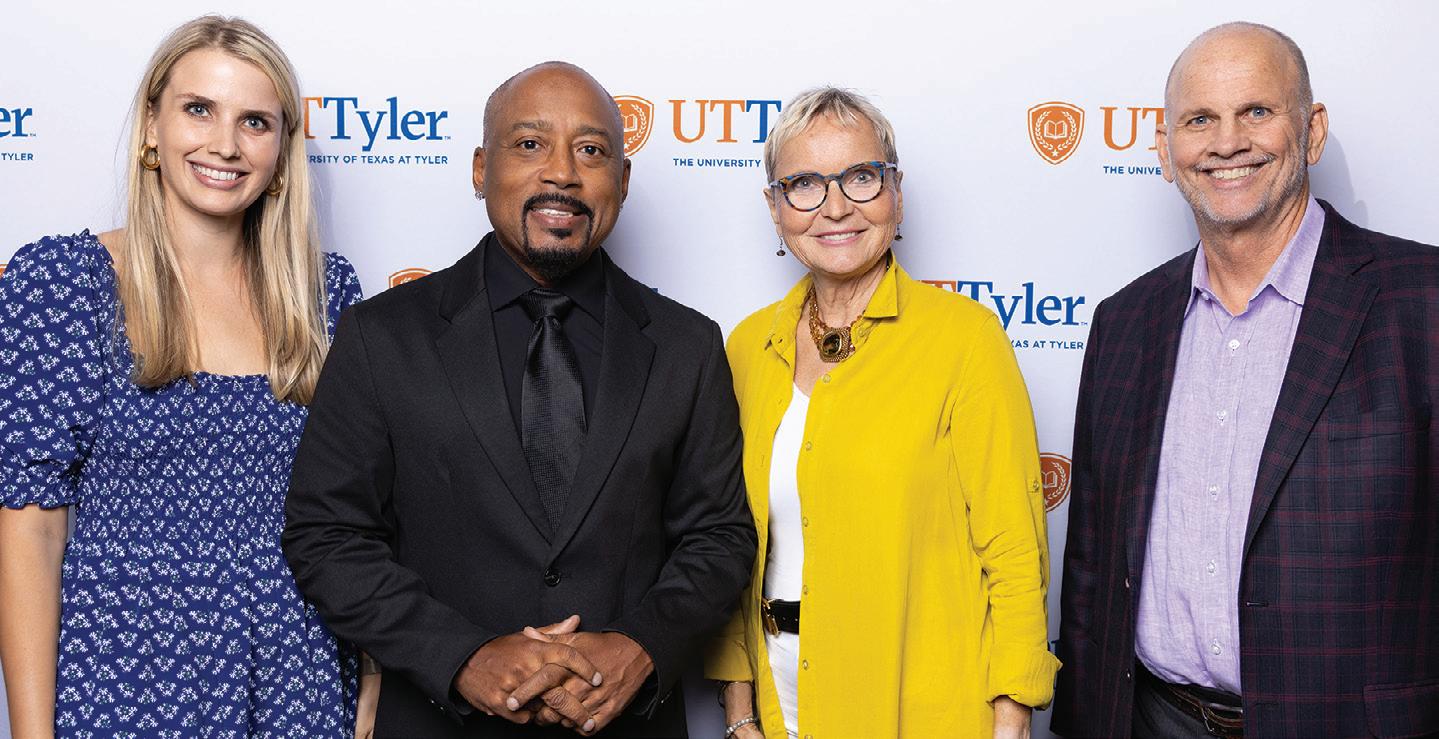
The awardwinning entrepreneur told the audience how he turned a $100,000 mortgage on his mother’s house into a muchcelebrated global lifestyle brand with more than $6 billion in product sales worldwide. John is the author of five bestselling books.
Pulitzer Prizewinning author Doris Kearns Goodwin was the second and final speaker of the 202223 UT Tyler R. Don Cowan Distinguished Lecture Series, presented in part by Patrick Willis Strategic Consulting.
Goodwin’s career as a presidential historian and author was inspired when, as a 24year old graduate student at Harvard University, she was selected to join the White House Fellows, one of America’s most prestigious programs for leadership and public service, during the Lyndon Baines Johnson administration.
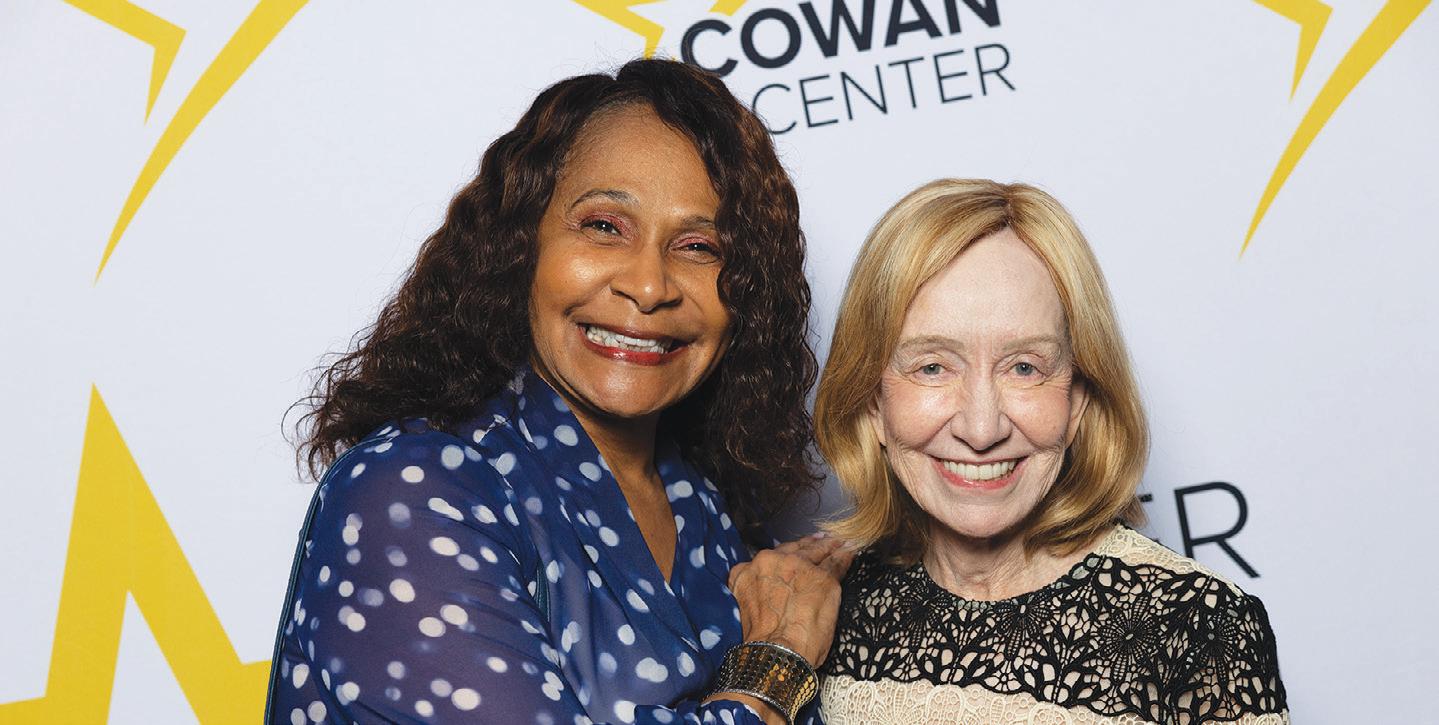






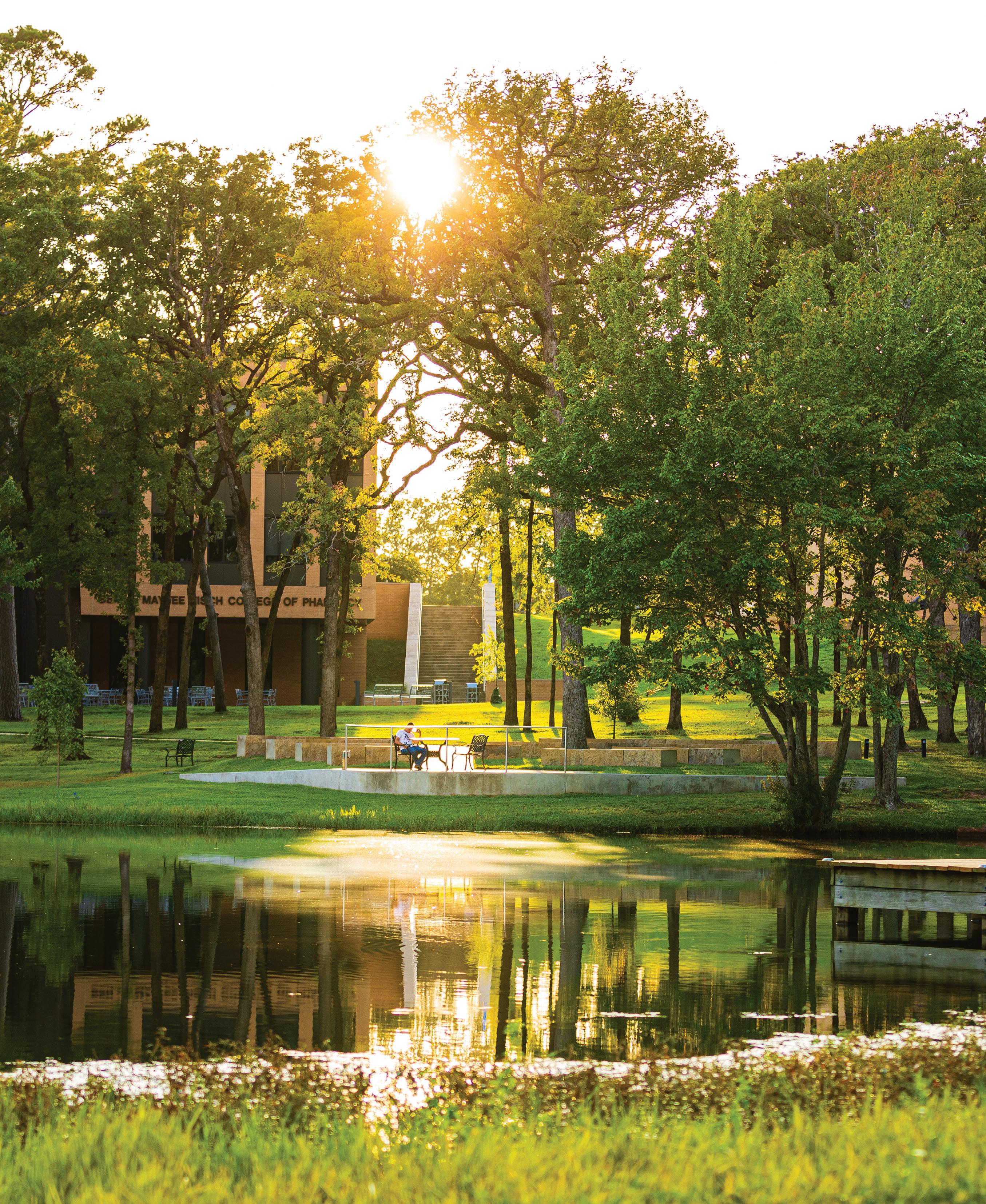
FOUNDING DEAN’S PASSION FOR EDUCATION WILL IMPACT GENERATIONS OF PHARMACY GRADUATES
AS THE FOUNDING dean of The University of Texas at Tyler Ben and Maytee Fisch College of Pharmacy, Dr. Lane Jerry Brunner created a legacy that will impact generations of UT Tyler pharmacy graduates.
“Dr. Brunner played a tremendous role in establishing the college and building the program,” says President Kirk A. Calhoun, MD, FACP. “His passion for pharmacy education is quite evident in the college today. Dr. Brunner was, and will forever be, a very important part of UT Tyler.”
Brunner passed away on Aug. 31, 2022, after a long illness.
Born in Offenbach, Germany, to Karin Wissig and Howard Ray Brunner, Brunner traveled extensively before settling in Seattle, Washington, where he began his lifelong career in pharmacy research and met his wife of 32 years, Molly.
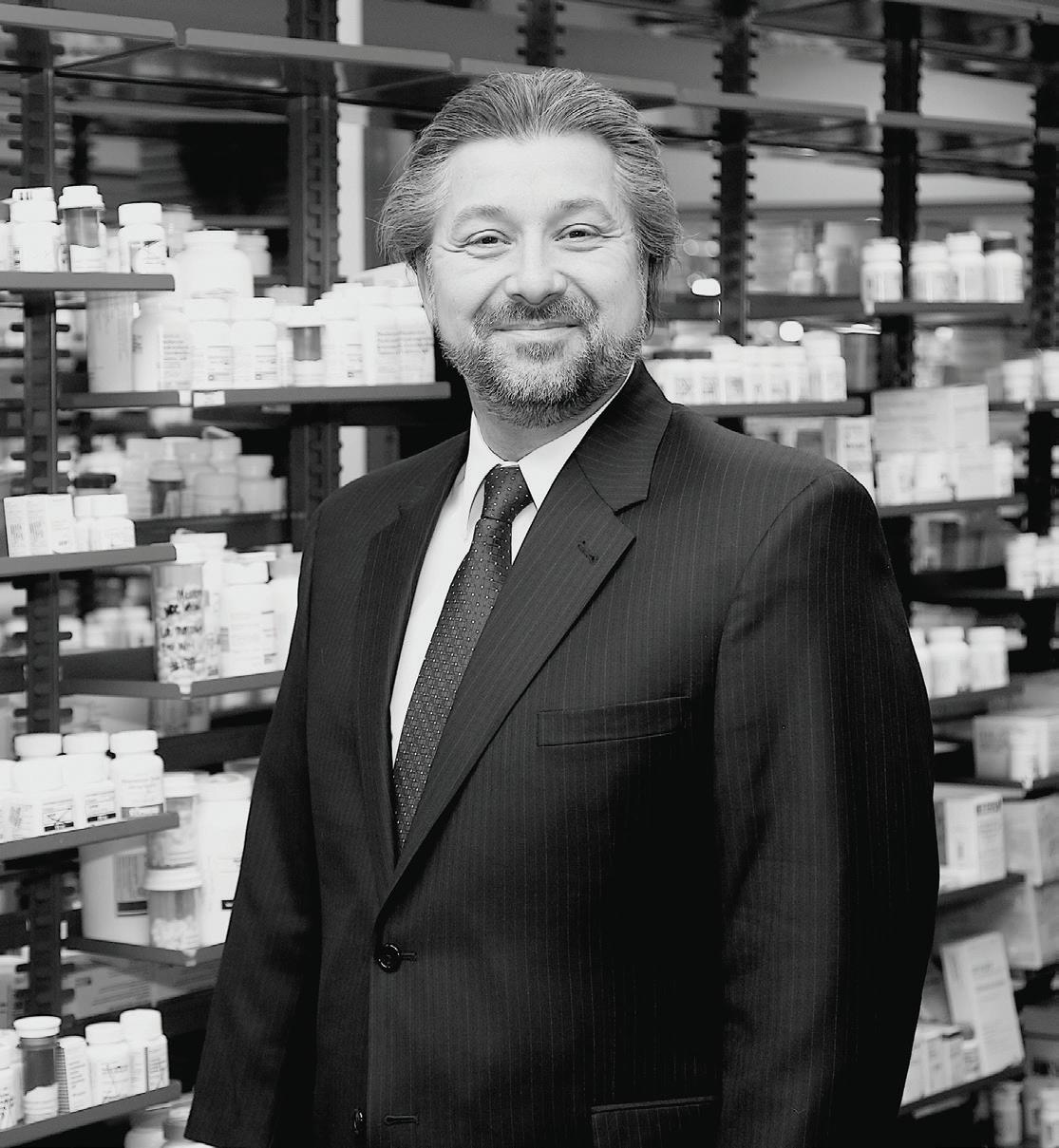
Brunner earned a Bachelor of Science degree from the University of Washington School of Pharmacy, a Master of Science in Pharmaceutics from the University of Houston and a Doctor of Philosophy in Pharmacy, specializing in pharmacokinetics, from the University of Georgia.
His many professional accomplishments include multiple graduate and postdoctoral fellowships, including research for NASA, and he cherished his work as the dean of the UT Tyler Fisch College of Pharmacy, a position he held for nine years.
He will be remembered for his sense of humor and strong work ethic, both of which endeared him to faculty and students alike.
Brunner is survived by his wife, his parents and his three children, Jordan, Evan and Lauren.
Dr. Thomas Fernandez
Former Vice President of Academic Affairs
Jan. 25, 2022
Dr. Patricia Gajda
Professor Emeritus of History College of Arts and Sciences
Jan. 20, 2022
Dr. Zafer Miqdadi
Assistant Professor of Instruction College of Engineering
Dec. 23, 2021
John Montalto Adjunct Lecturer College of Nursing and Health Sciences
Dec. 22, 2021
Billie Rix Library Assistant I Robert R. Muntz Library
Dec. 3, 2021
Dr. Jimmy “Jim’’ Lee Tarter Professor Emeritus, Former Dean Soules College of Business
Jan. 6, 2023
Dr. Robert Wells Assistant Professor College of Engineering
Feb. 15, 2022
The University of Texas at Tyler family also pays tribute to the memory of:

